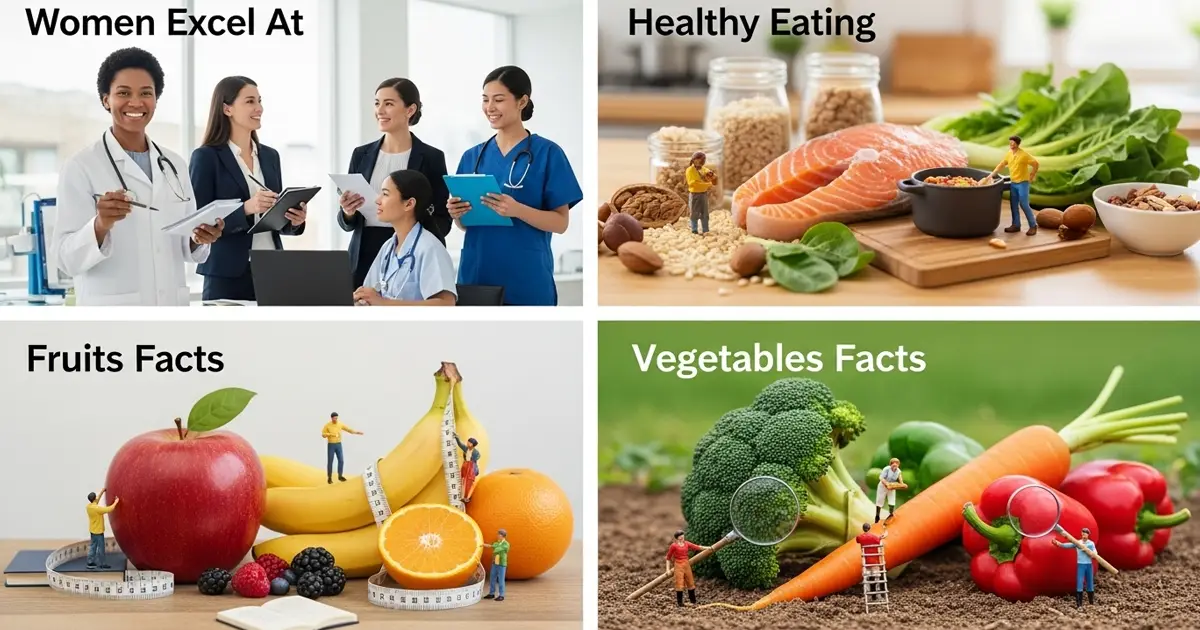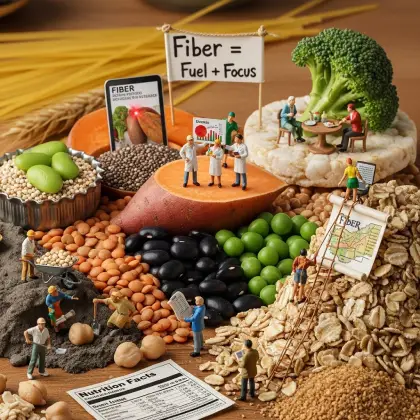Healthy Lifestyle Routine Facts
Healthy Lifestyle Routine
Facts
Facts for Curious Minds
If you're passionate about learning, fascinated by fun facts, or simply love being surprised by cool tidbits of information, you're in the right place. Explore our collection and uncover something new and exciting today!
Eager to dive in and fuel your curiosity?
Let's get started!

you'll take meaningful steps toward a healthier, happier,
and more balanced lifestyle.
daily routine, you'll take meaningful steps toward a healthier,
happier, and more balanced lifestyle.
yet compelling facts
into your daily routine,
you'll take meaningful steps
toward a healthier, happier,
and more balanced lifestyle.
Woman Excel @
Part 1 to 10
Women are making incredible strides in every field, breaking barriers and shaping the future! Their leadership, resilience, and innovation are driving change in science, business, and advocacy. These facts highlight their impact and remind us to celebrate, support, and uplift the women who continue to inspire progress every day!
Woman Excel @
Part 1

Woman Excel @
Part 1

Skilled Multitaskers: Women possess a remarkable talent for keeping everything organized while managing competing demands. Their ability to juggle tasks with precision shows not only their focus but also their strong organizational skills. Whether it's meeting deadlines at work or running a household efficiently, they always seem to be one step ahead.
Time Efficiency: One of the reasons multitasking is so effective for women is how it helps them make the most of their time. By tackling multiple things at once, they're able to complete tasks more quickly without compromising on quality. It's a productivity booster that allows them to excel in their personal and professional lives.
Versatility: What's truly special about women's multitasking ability is how adaptable it is. They can shift seamlessly between various roles and responsibilities, whether they're planning a business project or organizing a family gathering. This versatility enables them to balance the different facets of their lives with grace and efficiency.
Enhanced Efficiency: When multitasking is done thoughtfully, it leads to improved workflows. Women know how to streamline processes, making it easier to focus on priorities and achieve their goals. By staying efficient, they're able to maximize their efforts and accomplish more in less time.
Adaptability: Finally, let's not overlook how multitasking equips women to handle the unexpected. Life is full of surprises, and their ability to adapt quickly while staying composed allows them to overcome challenges with confidence. Whether it's a sudden change at work or a family emergency, they're always ready to step up and manage the situation effectively.
Woman Excel @
Part 2

Woman Excel @
Part 2

Higher Education Pursuit: Today, we see more women pursuing higher education than ever before. This growing trend isn't just about earning degrees, it's about gaining the knowledge and skills necessary to thrive in an ever-changing world.
Career Opportunities: With higher education comes a wealth of new career opportunities. Women are entering diverse fields, breaking barriers, and excelling in roles that were once out of reach. Their education empowers them to take on challenges and achieve remarkable success.
Job Security: Education plays a key role in providing better job security. For women, higher education often translates to stable careers and higher incomes, which contribute not only to their personal financial stability but also to the well-being of their families.
Mentorship and Inspiration: Beyond their own success, educated women are making a difference by mentoring and inspiring others. Whether in workplaces, schools, or communities, they serve as role models, encouraging others to dream big and achieve more.
Driving Progress: The impact of educated women goes far beyond individual achievements. They are instrumental in driving social and economic progress, shaping their communities, and contributing to a more equitable and prosperous world.
Woman Excel @
Part 3

Woman Excel @
Part 3

Global Workforce: Today, women make up nearly half of the global workforce, and their presence is vital to economic growth. From entry-level positions to executive roles, they're contributing their skills and talents to every sector imaginable. It's a reminder of just how integral women are to the functioning of our economies.
Economic Impact: One of the most remarkable things about women's participation in the workforce is the impact they have on economic development. Their ability to drive innovation and boost efficiency helps businesses thrive, while their presence fuels overall economic progress on both local and global scales.
Diverse Perspectives: A key advantage women bring to the table is their diverse perspectives. Their viewpoints often lead to creative problem-solving and spark new ideas. This diversity enriches workplace dynamics and enhances the collective ability to tackle complex challenges.
Promoting Equality: Women's growing involvement in the workforce also plays an essential role in advancing gender equality. Their contributions help break down barriers, create inclusive work environments, and inspire others to aim for equitable opportunities in their careers.
Balanced Workforce: Finally, we see how a workforce that embraces diversity, including gender diversity, creates a fairer and more equitable environment. Women's participation leads to improved working conditions and ensures that opportunities are accessible to everyone. It's this balance that drives progress for all employees, regardless of their background.
Woman Excel @
Part 4

Woman Excel @
Part 4

Influential Leaders: Women leaders have become a driving force for change. Many hold top positions in businesses and governments, where they steer initiatives that create meaningful impact. Their contributions are shaping industries, communities, and nations alike.
Strategic Decision-Making: Women excel at making key decisions that influence the direction of organizations and public policy. Their strategic thinking ensures that important goals are met while fostering innovation and growth. They are not just leading; they're transforming the way leadership is defined.
Inclusive Insights: One of the greatest strengths women bring to leadership roles is their unique perspective. This often leads to more inclusive and equitable policies that address the diverse needs of people in workplaces and communities. Their insights create a fairer and more balanced approach to governance and business.
Role Models: Beyond their current roles, women leaders play a vital part in inspiring the next generation. They mentor and guide aspiring professionals, paving the way for future leaders. Their achievements remind others that leadership is attainable for anyone who dreams big and works hard.
Collaborative Cultures: Women in leadership often prioritize collaboration and empathy. They foster workplace cultures that emphasize teamwork, trust, and mutual respect. This not only enhances morale but also drives better outcomes, as collective efforts lead to stronger results.
Woman Excel @
Part 5

Woman Excel @
Part 5

Rising Entrepreneurs: Today, more women are launching their own businesses than ever before. It's exciting to see this surge in entrepreneurship, as women are introducing innovative ideas, creating jobs, and making a lasting impact in their fields. Their ventures showcase resilience and ambition, inspiring others to follow suit.
Innovative Solutions: What sets female entrepreneurs apart is their ability to tackle real-world challenges head-on. Many focus on addressing social and community issues, developing solutions that make a difference. Whether it's through tech startups, education programs, or sustainable practices, their businesses are contributing to meaningful change.
Economic Growth: Women's entrepreneurship isn't just beneficial to their businesses; it's driving economic growth on a larger scale. Their companies boost local economies, contribute to global development, and create opportunities that ripple across communities. Women's businesses are truly a powerhouse for progress.
Inspiring Leaders: Beyond building successful businesses, female entrepreneurs often take on the role of mentors and role models. Their stories inspire countless others to chase their own entrepreneurial dreams. By sharing their experiences, they're helping the next generation of leaders gain the confidence to step forward and innovate.
Empowering Change: Perhaps the most exciting aspect of women's entrepreneurial efforts is the way they inspire transformation. Their work sparks progress not just in their own industries but also in society at large. By challenging norms and breaking barriers, women entrepreneurs are paving the way for new generations of change-makers to thrive.
Woman Excel @
Part 6

Woman Excel @
Part 6

Organizational Excellence: Women are known for their remarkable ability to organize their time effectively. Whether it's planning a packed schedule or prioritizing tasks, their strong organizational skills enable them to stay on top of their responsibilities with grace.
Balancing Act: One of the standout qualities of women is how they juggle multiple roles seamlessly. Effective time management allows them to switch between their professional and personal commitments without missing a beat, making it look effortless, even when it's anything but.
Stress Reduction: Let's face it, life gets busy and stressful. But good time management can make all the difference. By planning ahead and staying organized, women reduce the stress that comes with last-minute rushes, while boosting their overall productivity.
Work-Life Harmony: Women often strive for that delicate balance between work and personal life. Managing time effectively helps them carve out space for both their professional goals and their personal priorities, ensuring neither is neglected. It's not just about balance, it's about harmony.
Personal Growth: Finally, time management isn't just about meeting deadlines or fulfilling obligations; it's about creating opportunities for growth. Women who manage their time efficiently often find space to pursue personal development—whether it's learning a new skill, engaging in a hobby, or simply taking a moment for self-care.
Woman Excel @
Part 7

Woman Excel @
Part 7

Solution Seekers: Women consistently demonstrate their ability to navigate tough situations and uncover the best paths forward. Whether it's handling complex work dilemmas or resolving personal challenges, their problem-solving skills shine through, making them invaluable contributors to any endeavor.
Team Assets: In collaborative environments, women's problem-solving strengths stand out even more. Their ability to address issues head-on makes them indispensable members of any team or project, ensuring progress even when faced with obstacles.
Inclusive Approach: One of the key aspects of women's problem-solving is their ability to consider diverse viewpoints. By listening to different perspectives, they often arrive at well-rounded solutions that are inclusive and cater to a variety of needs. This thoughtful approach fosters teamwork and innovation.
Strategic Diversity: Women excel at employing a variety of strategies to tackle challenges. Their ability to adapt and innovate leads to creative, effective solutions that often surpass expectations. This strategic diversity is a true asset, especially in today's fast-paced and complex world.
Long-Term Success: Problem-solving isn't just about addressing the immediate issue, it's about setting the stage for sustainable success. Women's strengths in this area contribute to continuous innovation and progress, ensuring long-lasting impact in their personal lives, workplaces, and communities.
Woman Excel @
Part 8

Woman Excel @
Part 8

Driving Innovation: Women are making significant strides in the fields of science, technology, arts, and business, developing ideas and technologies that propel societal progress. From ground-breaking inventions to creative solutions, their innovative spirit fuels advancements that improve how we live and work.
Societal Impact: What sets women innovators apart is their unique focus on addressing unmet needs. Their creativity often leads to solutions that directly improve lives and create lasting value. Whether it's a product that meets community needs or an idea that reshapes an industry, their work enhances the quality of life for countless people.
Economic Growth: Women's contributions to innovation extend to driving economic transformation. By establishing and growing industries, they foster economic development on both local and global scales. Their influence helps create jobs, boost productivity, and encourage sustainable growth.
Inspiring Change: Female innovators often become catalysts for change, making discoveries and advancements that inspire future generations. They show others what's possible through their achievements and determination, paving the way for more women to enter and excel in fields of innovation.
Empowering Solutions: One of the most powerful aspects of women-led innovation is its ability to tackle critical social and community issues. Their creative approaches provide impactful solutions to problems that matter, from sustainability to healthcare. Through their ingenuity, they empower communities and bring about meaningful change.
Woman Excel @
Part 9

Woman Excel @
Part 9

Team Effectiveness: Women often shine in team settings because they know how to work collaboratively and keep things moving smoothly. Their communication skills, empathy, and knack for understanding different perspectives make them instrumental in boosting overall team performance.
Accelerated Results: Effective collaboration isn't just about getting along, it's about achieving tangible outcomes. Women's ability to coordinate efforts and ensure everyone stays aligned leads to faster, more efficient results. Their focus on teamwork creates a dynamic that gets things done without sacrificing quality.
Creativity and Productivity: Collaboration isn't just functional; it's also a catalyst for creativity and productivity. Women help foster environments where ideas flow freely, and team members feel inspired to contribute. This synergy often results in innovative solutions and highly productive teams.
Building Trust: One of the key elements of collaboration is trust, and women excel at building strong, trustworthy relationships within teams. Their ability to nurture connections and communicate openly helps strengthen bonds among team members, ensuring smoother interactions and stronger outcomes.
Cohesive Teams: Ultimately, women's collaborative skills lead to the formation of teams that work together seamlessly. Their efforts contribute to creating a sense of unity, where every member feels valued and supported. This cohesion enhances teamwork, morale, and overall success.
Woman Excel @
Part 10

Woman Excel @
Part 10

Overcoming Obstacles: Women have an incredible ability to overcome obstacles, whether in their personal lives or professional journeys. They face challenges with courage and resourcefulness, finding ways to move forward even when the odds are stacked against them.
Success in Adversity: Resilience isn't just about surviving tough situations; it's about thriving in them. Women's ability to adapt and persevere allows them to find success in the face of adversity, often turning setbacks into opportunities for growth and achievement.
Role Models: Resilient women often stand as powerful examples of determination and courage. Their stories inspire others to face their own challenges with confidence, reminding us all that strength can be found even in the most difficult times.
Personal Growth: The ability to bounce back from hardships also contributes to personal development. Through resilience, women build the skills and perspective needed to achieve long-term success, fostering growth both in their careers and in their personal lives.
Leadership and Inspiration: Resilience enhances women's ability to lead and inspire others. Whether they're guiding a team through challenges or mentoring someone who's facing their own struggles, their example sets the tone for leadership that's grounded in strength and empathy.
Woman Excel @
Part 11 to 20
Women are making incredible strides in every field, breaking barriers and shaping the future! Their leadership, resilience, and innovation are driving change in science, business, and advocacy. These facts highlight their impact and remind us to celebrate, support, and uplift the women who continue to inspire progress every day!
Woman Excel @
Part 11

Woman Excel @
Part 11

Mastering Balance: Many women have an incredible knack for balancing work responsibilities with family commitments. Whether it's leading a team at work or caring for loved ones at home, they show remarkable organizational skills and adaptability to navigate their multifaceted roles effectively.
Role Management: One of the key aspects of this balance is how women handle multiple responsibilities. They're able to shift seamlessly between roles, managing their time and energy in ways that ensure everything, and everyone, gets the attention it needs. Their ability to prioritize and adapt is what sets them apart.
Family Well-being: Striking a balance isn't just beneficial for the individual; it has a ripple effect on the entire family. When women manage work and home life effectively, it often leads to greater happiness and well-being for their families. Their efforts create a nurturing environment where everyone feels cared for and supported.
Personal Fulfillment: A healthy work-life balance also allows women to focus on themselves, engaging in hobbies, passions, or simply taking time to recharge. This personal fulfillment is vital; it boosts their overall happiness and helps them stay motivated and energized.
Healthier Households: Ultimately, achieving this balance contributes to creating healthier, happier households. When women manage to harmonize work and family demands, it fosters a sense of stability and connection that benefits everyone under the same roof.
Woman Excel @
Part 12

Woman Excel @
Part 12

Essential Contributors: Women play an indispensable role in health care. Whether as doctors, nurses, researchers, or administrators, they are vital to the system. Their presence ensures that patients receive top-notch care and that the medical field continues to grow and evolve.
Life Savers: Every day, women in health care save lives. Their knowledge, skills, and compassion are what make the difference in critical moments. From emergency rooms to research labs, their efforts directly improve the health and well-being of countless individuals.
Empathetic Care: One of the standout qualities of women in health care is the empathy they bring to their work. Their ability to connect with patients and provide thoughtful, personalized care often leads to better outcomes and a more positive healing experience.
Health Advocates: Women aren't just caring for individuals; they're advocating for systemic change. They work tirelessly to champion better health policies, practices, and access to care. Their efforts drive positive changes that benefit entire communities and populations.
Public Health Impact: The contributions of women in health care extend far beyond hospitals and clinics. Their work has a profound impact on public health, improving overall wellness and addressing key health challenges. Whether through preventative care, education, or innovative solutions, their influence is felt at every level of society.
Woman Excel @
Part 13

Woman Excel @
Part 13

Major Contributors: Women are the backbone of the education sector, serving as teachers, administrators, and mentors. Their efforts shape the minds of future generations, providing the foundation for lifelong learning and success. By nurturing students, they help unlock potential and open doors to opportunities.
Future Shapers: The impact of women in education goes far beyond the classroom. Their work leaves a lasting impression on children's growth and development, influencing not only their academic success but also their confidence and character. Women in education help pave the way for their students to thrive in every aspect of life.
Role Models: Educated women often serve as powerful role models for their students. By demonstrating dedication, resilience, and a commitment to excellence, they inspire young minds to dream big and work hard to achieve their goals. Their example shows students what is possible with determination and learning.
Lifelong Learning: One of the greatest legacies women in education leave behind is a love of learning. Their enthusiasm and encouragement foster curiosity, creativity, and a hunger for knowledge, instilling habits that students carry with them throughout their lives.
Policy Advocates: Women's leadership in education doesn't end with teaching. Many drive important changes by advocating for policies that improve educational systems. From curriculum enhancements to better resources for students and teachers, their voices bring about meaningful progress.
Woman Excel @
Part 14

Woman Excel @
Part 14

Volunteer Leaders: Women frequently take on leadership roles in community projects, organizing events, and volunteering their time to make a difference. Their enthusiasm and commitment inspire others to join in, creating a ripple effect of positive change.
Strengthening Communities: Through their efforts, women play a significant role in strengthening community ties. Whether it's organizing local initiatives or simply lending a helping hand, their support brings people together and helps forge deeper bonds among neighbors.
Unity and Support: Women's involvement fosters a sense of unity within communities. They create spaces where people feel supported and encouraged, making it easier to tackle challenges together and celebrate successes collectively.
Effective Solutions: One of the standout qualities of women-led community projects is their ability to address local needs effectively. Women bring creative and practical solutions to the table, ensuring that the challenges faced by their communities are met with thoughtful action.
Social Cohesion: The active participation of women in community initiatives promotes social cohesion, paving the way for development and growth. Their contributions help create inclusive environments where everyone feels valued and connected, fostering a sense of shared purpose.
Woman Excel @
Part 15

Woman Excel @
Part 15

Effective Communicators: Women have a natural ability to communicate with clarity and purpose. Their strong verbal skills help articulate ideas effectively, while their non-verbal cues, like empathy and active listening, strengthen their connections with others. This blend of skills makes their communication truly impactful.
Preventing Misunderstandings: Clear communication is essential in any setting, and women's ability to express themselves thoughtfully helps prevent misunderstandings. By ensuring everyone is on the same page, they create smoother interactions and avoid potential conflicts or confusion.
Team Morale: Strong communication is a key factor in creating positive team dynamics. Women's ability to communicate openly and supportively boosts morale, builds trust, and enhances efficiency within a team. Their knack for collaboration ensures that goals are met with shared enthusiasm and effort.
Building Relationships: Communication isn't just about getting tasks done; it's about building lasting connections. Women excel in forming strong relationships by using their communication skills to foster mutual understanding and respect, whether in personal friendships or professional partnerships.
Conflict Resolution: Conflicts are bound to arise, but women's ability to approach them with calm, thoughtful communication is invaluable. By listening to all sides and offering solutions, they help resolve issues in a way that leads to harmonious outcomes and strengthens relationships.
Woman Excel @
Part 16

Woman Excel @
Part 16

Workplace Empathy: Women often bring a natural sense of understanding and compassion to the workplace. This empathy fosters a positive and supportive environment, where colleagues feel valued and appreciated. Their ability to connect on a personal level strengthens teamwork and helps create a space where everyone can thrive.
Productive Atmosphere: A workplace guided by empathy doesn't just feel better; it works better too. Women's empathetic approach helps reduce tension, improve communication, and enhance collaboration, all of which contribute to a more harmonious and productive atmosphere. When people feel supported, they're more motivated to give their best.
Customer Relations: Empathy also plays a vital role in interactions with clients and customers. Women's ability to understand others' perspectives and respond thoughtfully leads to better service and higher satisfaction levels. These strong relationships build trust and loyalty, which are crucial for long-term success.
Inclusive Leadership: Empathetic leadership is transformative, and women excel at creating cultures of respect and inclusivity. By valuing diverse perspectives and promoting collaboration, they build teams that work cohesively and celebrate individual contributions. This inclusive environment drives innovation and shared success.
Supportive Environment: Ultimately, women's empathetic approach contributes to a more caring and supportive workplace. Whether addressing challenges or celebrating achievements, their compassion strengthens the bonds within a team and fosters a sense of community. This supportive atmosphere not only benefits individuals but also creates a workplace culture that thrives.
Woman Excel @
Part 17

Woman Excel @
Part 17

Meticulous Observers: Women are naturally meticulous observers. They have an incredible ability to pick up on small details that others might overlook. This thoroughness ensures that their work is complete, accurate, and well-executed, leaving no room for missed opportunities or mistakes.
Quality Assurance: Precision is key when it comes to delivering high-quality results, and women's attention to detail plays a crucial role in achieving this. By focusing on every aspect of a project or task, they minimize errors and ensure the highest standards are met time and again.
Cost Prevention: Beyond ensuring quality, attention to detail also has a practical impact, preventing costly mistakes. Women's careful approach helps streamline processes and improves overall efficiency, saving time, resources, and money in the long run.
Reliable Outcomes: Consistency is another benefit of high attention to detail. Women's dedication to thoroughness produces dependable results, whether they're managing a complex project or handling day-to-day responsibilities. Their reliability fosters trust and confidence in their work.
Organizational Reputation: Finally, attention to detail has a ripple effect. Women's ability to produce high-quality, accurate work enhances the reputation of the organizations and teams they're part of. Their meticulous contributions build credibility and help set a standard of excellence.
Woman Excel @
Part 18

Woman Excel @
Part 18

Strong Networks: Women are natural networkers. Whether at professional events, within their workplaces, or through social platforms, they excel at forming robust connections. These networks go beyond surface-level relationships; they are built on trust, collaboration, and mutual support, creating a foundation for lasting partnerships.
Career Growth: One of the most impactful benefits of networking is how it can open doors to new opportunities. Women's networks often play a critical role in career advancement, whether by uncovering job opportunities, gaining referrals, or connecting with mentors who help guide their professional journey.
Mentorship Opportunities: Strong networks also create a space for mentorship. Women often use these connections to learn from others, share knowledge, and collaborate on personal or professional growth. This exchange of experiences enhances their skills and provides guidance that can lead to new achievements.
New Ventures: Networking isn't just about growing within an existing career, it's also a powerful tool for launching new ideas. Women frequently leverage their networks to start new partnerships, business ventures, or collaborative projects, driving innovation and creating new opportunities for themselves and others.
Lifelong Support: Perhaps one of the most valuable aspects of networking is the lifelong relationships it fosters. Women's connections often evolve into lasting support systems that enrich both their careers and personal lives. These relationships offer encouragement, advice, and a sense of community that extends far beyond a single event or interaction.
Woman Excel @
Part 19

Woman Excel @
Part 19

Cultural Influencers: Women's involvement in the arts, writing, and media has significantly impacted the way we view the world. Through their creations, whether it's a moving novel, an evocative painting, or an impactful film, they help shape cultural narratives, inspire emotions, and spark conversations that bring important issues to light.
Promoting Tolerance: One of the most beautiful aspects of women's cultural contributions is their ability to promote understanding and tolerance. By sharing diverse perspectives and experiences through their work, they build bridges across communities, helping people appreciate differences and connect on a deeper level.
Challenging Stereotypes: Women often use their creative platforms to challenge societal stereotypes and break down barriers. Through art, storytelling, and media, they inspire change by confronting preconceived notions and encouraging society to think critically about gender roles and equality.
Preserving Heritage: Women also play a crucial role in preserving heritage and traditions. Their work often celebrates cultural legacies, ensuring that stories, practices, and identities are passed down to future generations. This preservation enriches our shared history while keeping it alive for the years to come.
Inspiring Creators: Perhaps one of the most lasting impacts women have in the cultural realm is their ability to inspire others. Their art and ideas motivate new generations of creators to express themselves, innovate, and continue shaping society in positive and meaningful ways.
Woman Excel @
Part 20

Woman Excel @
Part 20

Boosting Growth: One of the most impactful ways women contribute is by fueling overall economic growth. When women join the workforce or start businesses, they bring fresh ideas, innovation, and energy that propel industries forward. Their participation enriches the economy and creates benefits that ripple across all levels of society.
Balanced Economy: A diverse workforce that includes women is crucial for creating a balanced and resilient economy. Women's unique perspectives and approaches complement those of their male counterparts, leading to well-rounded decision-making and stronger outcomes. This diversity strengthens the economy's ability to adapt and thrive, even in challenging times.
Poverty Reduction: Empowering women economically has a direct effect on reducing poverty. When women have access to jobs, education, and resources, they can improve their families' living standards, creating a ripple effect of financial stability within communities. This empowerment lifts households and contributes to closing income gaps.
Sustainable Development: Women's economic contributions also play a key role in achieving sustainable development. By participating in industries and championing new initiatives, women drive progress that balances economic growth with environmental and social responsibility. Their involvement ensures that development is not only impactful today but remains beneficial for future generations.
Inclusive Prosperity: Perhaps most importantly, women's active engagement in the economy promotes inclusive prosperity. Their leadership and collaboration foster social well-being, ensuring that opportunities and benefits are shared more equitably across society. This inclusivity not only strengthens communities but also lays the foundation for long-term progress.
Healthy Eating
Part 1 to 10
Eating well is one of the best things you can do for your body and mind! Nutritious foods give you energy, strengthen your immune system, and keep your brain sharp. It's all about making mindful choices, balancing vitamins, minerals, and healthy meals to feel your best. These insights will help you make smarter food decisions and enjoy a vibrant, healthy life!
Healthy Eating
Part 1

Healthy Eating
Part 1

Nutrient Powerhouses: Fruits and vegetables are like little bundles of goodness. They're loaded with essential vitamins, minerals, and antioxidants that your body needs to function at its best. Think of them as fuel for your health; each bite is a step toward feeling stronger and more vibrant.
Boost Immunity: One of the amazing things about fruits and veggies is how they support your immune system. By eating a variety of them regularly, you're giving your body the tools it needs to fight off illnesses. It's like building a defense system, one delicious meal at a time.
Energy Boosters: Ever notice how fruits and vegetables can give you that natural pick-me-up? The natural sugars and fiber in them provide a steady release of energy throughout the day. So instead of relying on that mid-afternoon coffee, a snack like an apple or some carrot sticks can keep you energized.
Colorful Benefits: Here's where it gets fun, each color of fruits and vegetables comes with its own set of health perks. For example, the bright orange of carrots means they're packed with beta-carotene, which is great for your eyes. Meanwhile, the deep purple of grapes indicates anthocyanins, which are fantastic for brain health. Eating a variety of colors isn't just visually appealing; it's incredibly beneficial for your body.
Heart Health: Lastly, fruits and vegetables are wonderful for your heart. Incorporating a rainbow of them into your meals can help lower blood pressure, improve cardiovascular health, and keep your heart happy. It's a simple yet powerful way to take care of such an important part of your body.
Healthy Eating
Part 2

Healthy Eating
Part 2

Nutrient Powerhouses: Whole grains are packed with so much more than just carbohydrates. They're brimming with essential nutrients like antioxidants, vitamins, minerals, and fiber that your body needs to stay healthy. Think of them as little nutritional powerhouses that fuel your daily activities and help your body thrive.
Superior Choices: Whole grain options, such as whole grain bread, quinoa, and brown rice, are far better for your health compared to refined grains like white bread or white rice. The difference lies in how they're processed; whole grains retain their bran and germ, which means you're getting more nutrients and health benefits in every bite.
Digestive Health: One of the standout benefits of whole grains is their fiber content. Fiber is great for your digestion; it keeps everything moving smoothly, helps you feel full longer, and even prevents overeating. Incorporating whole grains into your meals is a simple way to support a healthy digestive system.
Heart Health: Whole grains are also great allies for your heart. Regularly eating foods like oats, barley, or whole grain pasta can help reduce cholesterol levels, lower your risk of heart disease, and support your cardiovascular health. It's like giving your heart a boost with every meal.
Sustained Energy: Lastly, if you've ever dealt with energy crashes, whole grains might be the solution. They provide a steady release of energy throughout the day, thanks to their natural fiber and complex carbohydrates. This keeps you feeling energized and focused, without the ups and downs that come from sugary or highly refined foods.
Healthy Eating
Part 3

Healthy Eating
Part 3

Essential Nutrient: Protein is more than just a nutrient; it's a fundamental part of your body's structure and function. It's responsible for building and repairing tissues, supporting your muscles, skin, and even your organs. Without enough protein, your body would struggle to heal itself and maintain overall well-being.
Muscle Growth: If you're active or interested in fitness, protein is your best friend. It's crucial for muscle growth and maintenance, helping you recover after workouts and stay strong. Whether you're lifting weights or just staying active, eating enough protein ensures your muscles are getting the support they need.
Satiety and Weight Management: One of the lesser-known benefits of protein is how it helps you stay full longer. Protein-rich foods, like eggs or lentils, slow digestion and keep hunger at bay, making it easier to manage your weight. It's a simple way to feel satisfied and avoid overeating.
Energy Source: Although carbohydrates are the body's primary energy source, protein steps in when you need it, especially during intense physical activities. It provides a steady release of energy, keeping you going when your body needs extra fuel to perform.
Metabolic Functions: Protein isn't just about muscles and energy; it's a multitasker in your body. It plays a key role in metabolic functions, such as enzyme production and hormone regulation. These processes are essential for everything from digestion to maintaining a healthy mood and energy balance.
Healthy Eating
Part 4

Healthy Eating
Part 4

Heart Health: Healthy fats, like those in avocados, nuts, seeds, and olive oil, are wonderful for your heart. They help lower bad cholesterol levels (LDL) while increasing good cholesterol (HDL), which supports better cardiovascular health. By including these fats in your diet, you're giving your heart the tools it needs to stay strong and healthy.
Brain Function: Your brain loves healthy fats, especially omega-3 fatty acids. Found in foods like salmon, flaxseeds, and walnuts, omega-3s are essential for maintaining cognitive function, memory, and overall brain health. Think of them as brain food; they keep your mind sharp and help prevent cognitive decline as you age.
Nutrient Absorption: Did you know that your body needs healthy fats to absorb certain vitamins? Vitamins A, D, E, and K are fat-soluble, meaning they rely on fats to be properly absorbed and utilized by your body. By including healthy fats in your meals, you're maximizing the nutritional value of the foods you eat.
Energy Source: Healthy fats are also a fantastic source of long-lasting energy. Unlike quick-burning sugars, fats provide a slow and steady release of energy that helps sustain you throughout the day. This is especially useful during physical activities or when you need to power through a busy schedule.
Inflammation Reduction: Finally, healthy fats play a key role in reducing inflammation in your body. Chronic inflammation can lead to various health issues, and incorporating anti-inflammatory fats like those in fatty fish, olive oil, and nuts can help promote overall well-being and prevent long-term damage.
Healthy Eating
Part 5

Healthy Eating
Part 5

Digestive Health: One of fiber's best-known benefits is how it helps with digestion. It adds bulk to your stool, making it easier for your body to process and preventing uncomfortable issues like constipation. It's like a natural tune-up for your digestive system!
Weight Management: Here's a great thing about fiber; it helps you feel full longer. High-fiber foods, like fruits, vegetables, and whole grains, slow down digestion and keep those hunger cravings in check. This makes it easier to avoid overeating and stick to your healthy eating goals.
Heart Health: Fiber does wonders for your heart, too. By reducing bad cholesterol levels, it can lower your risk of heart disease. Adding foods like oats, beans, and nuts to your diet is a simple way to give your heart the care it deserves.
Blood Sugar Control: Another fantastic benefit of fiber is how it helps regulate blood sugar levels. It slows the absorption of sugar into your bloodstream, preventing those sharp spikes and crashes. If you're looking to support your metabolic health, fiber is your ally.
Gut Health: Finally, fiber acts as a prebiotic, essentially food for the good bacteria in your gut. By nourishing these beneficial microbes, fiber helps promote a healthy microbiome, which is key to overall wellness and even immune health.
Healthy Eating
Part 6

Healthy Eating
Part 6

Vital for Health: First and foremost, staying hydrated supports your body's basic functions. Water is involved in digestion, circulation, and even transporting nutrients to your cells. Without enough of it, your body can't operate at its full potential, making hydration an absolute must for overall health.
Energy and Focus: Ever find yourself feeling drained or struggling to concentrate? A lot of that might come down to hydration. Drinking enough water helps maintain your energy levels and sharpens your focus. It's like giving your brain and body a little boost to keep you productive and alert throughout the day.
Temperature Regulation: Water also plays a key role in keeping your body temperature in check. Whether you're working out, dealing with hot weather, or just going about your day, staying hydrated helps you avoid overheating and keeps your body running smoothly.
Detoxification: Hydration is essential for flushing out toxins and waste. It supports your kidneys in doing their job, ensuring that harmful substances are filtered out. Think of water as your body's natural detox agent; it's simple, effective, and keeps everything clean on the inside.
Skin Health: Finally, let's not forget about the skin! Staying hydrated can work wonders for your complexion, helping to prevent dryness and promote that healthy, radiant glow. Water keeps your skin supple and nourished, which is just one more reason to prioritize hydration.
Healthy Eating
Part 7

Healthy Eating
Part 7

Weight Management: If you're looking to manage your weight, reducing sugar is a great place to start. Sugar adds extra calories to your diet, and often without providing the nutrients your body really needs. By cutting back on sugary snacks and drinks, you'll naturally decrease your calorie intake, which can help you stay on track with your weight goals.
Heart Health: Did you know that eating too much sugar can affect your heart? High sugar intake has been linked to increased blood pressure and cholesterol levels, both of which raise your risk of heart disease. Lowering your sugar consumption is a simple way to protect your heart and keep it healthy for the long run.
Improved Energy Levels: Ever experienced that energy crash after eating something sugary? That's because sugar causes your blood sugar levels to spike and then drop quickly. By reducing sugar in your diet, you can enjoy more stable energy levels throughout the day, no more afternoon slumps or sudden fatigue.
Better Oral Health: It's no secret that sugar isn't great for your teeth. Cutting back on sugary foods and drinks can reduce your risk of cavities and tooth decay, helping you maintain healthier teeth and gums. Your dentist will thank you, and your smile will, too!
Diabetes Prevention: Another important benefit of reducing sugar is its role in preventing type 2 diabetes. Eating less sugar helps improve your body's insulin sensitivity and keeps your blood sugar levels stable. It's a proactive way to lower your risk and support your overall metabolic health.
Healthy Eating
Part 8

Healthy Eating
Part 8

Overall Health: A balanced diet is like giving your body the tools it needs to function at its best. It provides all the essential nutrients, vitamins, minerals, proteins, fats, and carbohydrates that your body depends on to stay healthy. Whether it's supporting your immune system or keeping your bones strong, a variety of nutrient-rich foods makes all the difference.
Weight Management: Maintaining a healthy weight becomes much easier with a balanced diet. By eating the right proportions of nutrients, you're less likely to overindulge or feel deprived. It's about creating meals that satisfy you while giving your body the fuel it needs to stay active and strong.
Energy Levels: Feeling sluggish? What you eat could be the reason. A balanced diet helps maintain steady energy levels throughout the day by combining slow-releasing carbohydrates, proteins, and healthy fats. With the right foods, you can avoid those mid-afternoon energy crashes and stay energized and focused.
Disease Prevention: One of the most incredible benefits of a balanced diet is its role in preventing chronic diseases. By including a variety of nutrient-rich foods like fruits, vegetables, whole grains, and lean proteins, you can lower the risk of heart disease, diabetes, and even certain types of cancer. It's a powerful way to invest in your long-term health.
Mental Well-Being: What you eat affects not only your body but also your mind. A balanced diet supports brain health, improves mood, and enhances cognitive function. Foods rich in omega-3s, whole grains, and colorful fruits and vegetables can help you feel happier and think more clearly.
Healthy Eating
Part 9

Healthy Eating
Part 9

Weight Management: One of the easiest ways to manage weight is by practicing portion control. By keeping an eye on how much you're eating, you can regulate your calorie intake without feeling deprived. It's not about cutting out your favorite foods, it's about enjoying them in the right amounts so you stay on track with your health goals.
Preventing Overeating: Ever notice how easy it is to accidentally overeat, especially when servings are large? Portion control helps you avoid this by encouraging you to stick to appropriate serving sizes. It's a way to enjoy your meals without going overboard, which keeps your diet balanced and healthy.
Nutrient Balance: Another great thing about portion control is that it helps ensure you're getting a variety of nutrients in the right proportions. Instead of focusing too much on one type of food, you'll have a well-rounded plate that supports your overall health. It's all about balance, proteins, carbs, fats, and plenty of fruits and vegetables in every meal.
Mindful Eating: Practicing portion control is a great way to slow down and really tune in to your body's hunger and fullness signals. This is what mindful eating is all about, paying attention to what and how much you're eating. It helps you appreciate your food more and build a healthier relationship with eating.
Better Digestion: Lastly, eating the right portions can do wonders for your digestion. When you avoid overeating, your body has an easier time breaking down and processing food, reducing the chances of digestive discomfort. It's a win-win; you feel lighter and more comfortable after meals.
Healthy Eating
Part 10

Healthy Eating
Part 10

Healthier Meals: One of the biggest benefits of cooking at home is the control you have over ingredients. You get to choose what goes into your dishes, which makes it easier to create healthier and more nutritious meals. Want to cut back on salt, sugar, or unhealthy fats? It's entirely up to you. By preparing meals yourself, you can make choices that align with your health goals.
Cost-Effective: Dining out or buying pre-packaged meals can quickly add up, but home cooking tends to be much more budget-friendly. Ingredients for homemade meals often cost less in the long run, especially when you plan ahead and buy in bulk. Plus, you'll likely get more portions from your efforts, saving money while enjoying great food.
Customization: Another wonderful aspect of home cooking is the ability to tailor meals to your preferences and dietary needs. Whether you're vegan, gluten-free, or just someone with a strong dislike for certain veggies, you have the freedom to adjust recipes and make meals exactly the way you like them. It's all about creating dishes that work for you and your lifestyle.
Quality Time: Cooking at home isn't just a chore; it can be a fun and rewarding experience, especially when shared with loved ones. Whether you're trying out new recipes with friends or baking treats with your kids, home cooking provides an opportunity to bond and spend meaningful time together. It turns mealtime into an experience rather than just a necessity.
Skill Development: Regular home cooking helps you grow your culinary skills and encourages creativity in the kitchen. Over time, you'll become more comfortable with techniques, learn new recipes, and even create your own signature dishes. It's not just about nourishing yourself, it's about mastering an enjoyable and practical skill.
Healthy Eating
Part 11 to 20
Eating well is one of the best things you can do for your body and mind! Nutritious foods give you energy, strengthen your immune system, and keep your brain sharp. It's all about making mindful choices, balancing vitamins, minerals, and healthy meals to feel your best. These insights will help you make smarter food decisions and enjoy a vibrant, healthy life!
Healthy Eating
Part 11

Healthy Eating
Part 11

Nutrient-Rich Choices: Fruits, nuts, and yogurt are fantastic alternatives to sugary or processed snacks like chips and candy. They're packed with essential vitamins, minerals, and healthy fats that your body needs to feel its best. With every bite, you're nourishing yourself in a way that keeps you energized and satisfied.
Steady Energy: One major perk of healthy snacks is how they provide long-lasting energy. Unlike sugary treats, which can lead to quick spikes and crashes, options like whole-grain crackers or a handful of nuts give you a steady supply of fuel to power through your day without that dreaded slump afterward.
Weight Management: Snacking wisely can also help with weight management. Healthy snacks keep hunger at bay and reduce the likelihood of overeating at meals. By reaching for something like a piece of fruit or a small portion of trail mix, you're more likely to stay on track with your health goals.
Essential Nutrients: Think of snacks as mini opportunities to fuel your body. When you choose nutritious options, you're adding important vitamins, minerals, and other nutrients to your diet. For example, a cup of yogurt provides calcium and probiotics, while a banana offers potassium and natural energy, perfect for staying focused and feeling your best.
Curbing Cravings: One of the best things about healthy snacking is how it helps curb unhealthy cravings. When you regularly choose wholesome snacks, you're less likely to reach for junk food. Over time, this builds better eating habits that are beneficial for your overall well-being.
Healthy Eating
Part 12

Healthy Eating
Part 12

Heart Health: One of the best reasons to opt for lean meats, like chicken, turkey, or fish, is their benefit to heart health. Unlike fatty cuts of beef or pork, lean meats have much lower levels of saturated fat, which helps keep your cholesterol in check and reduces your risk of heart disease. It's a simple swap that can make a big difference for your heart.
Essential Nutrients: Lean meats are loaded with important nutrients your body needs. They're a fantastic source of high-quality protein, which is essential for repairing tissues and staying strong. Plus, they provide iron to support healthy blood cells and B vitamins to boost energy and metabolism. It's like a nutritional package in every bite!
Muscle Strength: If you're looking to maintain or build muscle, lean meats are a smart choice. Their protein content supports muscle growth and recovery, whether you're hitting the gym or just staying active in your daily life. Lean meats help keep your body strong and resilient.
Lower Saturated Fat: Another great perk of choosing lean meats is reducing your intake of saturated fats. By swapping out fatty cuts of meat for lean options, you're promoting better overall health and reducing the risk of issues like high cholesterol and inflammation. It's a straightforward way to improve your diet.
Digestive Ease: Lastly, lean meats are gentler on your digestive system compared to fatty meats. Their lower fat content makes them easier to break down, which can help reduce digestive discomfort. They're a great option if you're looking for a meal that's satisfying and easy on your stomach.
Healthy Eating
Part 13

Healthy Eating
Part 13

Unhealthy Additives: A big downside of processed foods is the additives they often contain, things like unhealthy fats, excessive sugar, and lots of salt. While these ingredients might make the food taste good, they can take a toll on your health over time. When you reduce your intake of these foods, you're actively protecting your body from the negative effects of those additives.
Preservatives and Chemicals: Many processed foods are loaded with preservatives and artificial ingredients to increase their shelf life or enhance flavor. While they may seem harmless at first, consuming them regularly could pose potential health concerns. Choosing fresher, less processed options means giving your body cleaner, more natural nutrients to work with.
Obesity and Health Risks: Processed foods are often calorie-dense but nutrient-poor, which can lead to weight gain and serious health risks like obesity, diabetes, and heart disease. By replacing them with whole, natural foods, you're making a proactive choice to protect yourself from these preventable conditions.
Whole Foods Benefit: The great thing about switching to whole foods, like fresh fruits, vegetables, whole grains, and lean proteins, is that they're packed with natural nutrients and far fewer additives. These foods fuel your body the way it was meant to be fueled, leaving you feeling better, both mentally and physically.
Superior Taste and Nutrition: One more reason to ditch processed foods? Whole foods just taste better. They're fresher, richer in flavor, and loaded with the vitamins and minerals your body craves. Over time, you'll likely find that you prefer the satisfying, wholesome taste of real food over the artificial flavors in processed products.
Healthy Eating
Part 14

Healthy Eating
Part 14

Energy Boost: A healthy breakfast is like fuel for your body. After hours of rest during the night, your energy reserves are low. Eating a meal in the morning replenishes them and gives you the energy boost you need to kickstart your day. Whether you're heading to work, school, or a workout, breakfast helps you power through those first few hours.
Improved Concentration: Ever find it hard to focus when you skip breakfast? That's because your brain needs energy to function at its best. A nutritious breakfast, like oatmeal with fruit or eggs with whole-grain toast, provides the nutrients your brain needs to stay sharp, enhancing your concentration and cognitive performance throughout the day.
Metabolism Kickstart: Eating breakfast helps jumpstart your metabolism. Think of it like revving your engine first thing in the morning; your body begins burning calories more efficiently when you fuel it early on. It's a simple way to support your metabolism and keep it working effectively.
Craving Control: One of the great things about breakfast is how it helps curb cravings later in the day. When you skip breakfast, you're more likely to feel excessively hungry and reach for unhealthy snacks or overeat at lunch. Starting the day with a satisfying, balanced meal can help you stay on track and make healthier choices.
Blood Sugar Stability: Breakfast plays a key role in maintaining stable blood sugar levels. Without it, your blood sugar can drop, leading to fatigue and irritability, or spike when you grab a sugary snack to compensate. Eating a meal rich in protein, fiber, and healthy carbs keeps those levels steady, preventing the crashes that leave you drained.
Healthy Eating
Part 15

Healthy Eating
Part 15

Essential for Growth: Vitamins and minerals are absolutely crucial for your body's growth and development. They support everything from the formation of healthy tissues to proper organ function. Whether you're a growing child or simply maintaining a healthy adult life, these nutrients are non-negotiable for helping your body thrive.
Health Maintenance: It's not just about growth; vitamins and minerals play a key role in keeping your body strong and healthy. They're involved in countless processes, like maintaining strong bones, keeping your heart functioning smoothly, and even repairing damage at the cellular level. Their job is to keep everything working in harmony.
Immune Support: These nutrients are also essential for keeping your immune system in top shape. Vitamins like C and E, along with minerals like zinc, help your body fight off illnesses and stay resilient. When you're getting enough of these, your immune system has a better chance of protecting you.
Energy Boost: If you're feeling tired or sluggish, it might be your body signaling a need for more vitamins and minerals. Nutrients like iron, magnesium, and B vitamins are directly tied to your energy levels. Getting enough of them through your diet helps your body stay energized and combats fatigue.
Bodily Functions: Finally, vitamins and minerals are deeply involved in your body's daily operations. They support nerve function, muscle movement, and even cellular processes like repair and reproduction. Essentially, they're behind the scenes ensuring everything from your brain to your toes works seamlessly.
Healthy Eating
Part 16

Healthy Eating
Part 16

Better Food Choices: When you practice mindful eating, you naturally start paying closer attention to the food you choose. It's about thinking before you eat, asking yourself if the food is nourishing or just convenient, and making informed choices that benefit your health. Over time, you'll find yourself leaning toward fresher, more wholesome options.
Healthier Relationship with Food: Mindful eating helps you shift the way you view food. Instead of eating out of stress or habit, it encourages you to appreciate food as something positive and nourishing. This can lead to a healthier, more balanced relationship with what's on your plate, free from guilt or overeating.
Reduced Overeating: One of the most practical benefits of mindful eating is that it helps you recognize when you're truly hungry versus eating out of boredom or emotion. By focusing on the present moment and paying attention to your body's signals, you can stop eating when you're satisfied rather than overindulging.
Enhanced Appreciation: Mindful eating turns every meal into an experience. By slowing down and savoring the flavors, textures, and aromas of your food, you'll find yourself enjoying meals more than ever. It's not just about fueling your body, it's about finding joy in the act of eating.
Slower Eating Pace: Finally, mindful eating encourages you to slow down. Rushing through meals often leads to overeating and missing out on the flavors. Eating at a slower pace not only allows you to fully experience your food but also gives your body time to signal when it's had enough.
Healthy Eating
Part 17

Healthy Eating
Part 17

Fresher and Tastier: When you eat fruits and vegetables that are in season, you're getting them at their peak freshness. They're harvested closer to the time you buy them, meaning they haven't been sitting in storage or transported long distances. The result? Better flavor and texture that truly stand out in your meals.
Cost-Effective and Nutritious: Seasonal produce is typically more affordable than out-of-season options. Why? Local farmers can grow it naturally without relying on expensive out-of-season methods like greenhouses. Plus, shorter storage times mean it retains more of its nutrients, giving you better health benefits for your money.
Enhanced Flavor: Have you ever noticed how a summer strawberry tastes so much sweeter than one you eat in winter? That's because in-season produce has had the ideal growing conditions to develop its flavor. Meals become more enjoyable when the ingredients are bursting with natural taste.
Higher Nutrient Levels: The nutritional value of fruits and vegetables can degrade over time due to storage and transport. Seasonal foods, on the other hand, tend to have higher nutrient levels since they're fresher. Eating them can contribute to better health by providing your body with the vitamins and minerals it needs.
Support Local Farmers: Choosing seasonal produce is also a great way to support local farmers and the economy. By buying what's grown nearby, you're not only getting fresher ingredients but also contributing to a sustainable food system that benefits your community.
Healthy Eating
Part 18

Healthy Eating
Part 18

Organ Health: One of the main reasons to limit alcohol is to protect your liver and other vital organs. Over time, excessive drinking can lead to liver damage and strain on your heart and kidneys. By cutting back, you're giving these organs the opportunity to stay healthy and do their job without extra stress.
Mood and Energy: Have you ever noticed how alcohol can sometimes leave you feeling sluggish or a little down the next day? By limiting your alcohol intake, you can boost your mood and maintain consistent energy levels. You're more likely to wake up refreshed and ready to take on the day.
Better Sleep: While alcohol might make you feel drowsy initially, it can actually disrupt your sleep cycle later in the night. Reducing how much you drink, especially before bedtime, can help you sleep more soundly and wake up feeling properly rested.
Informed Choices: Alcohol can sometimes impair judgment, including the choices you make about what to eat and how you behave. By drinking less, you're more likely to stay in control and make decisions that align with your health and wellness goals, whether that's sticking to a nutritious meal plan or avoiding unnecessary risks.
Reduced Health Risks: Finally, cutting back on alcohol can significantly lower your risk of several serious health problems, such as heart disease, high blood pressure, and liver issues. It's a simple yet powerful way to protect your long-term health and feel better day-to-day.
Healthy Eating
Part 19

Healthy Eating
Part 19

Healthier Options: Baking, grilling, and steaming use far less oil compared to frying, which makes them healthier options. With these methods, you're not drenching your food in unhealthy fats. Instead, you get all the goodness of your ingredients, cooked in a way that supports your health goals.
Nutrient Retention: One of the best things about these cooking techniques is how they preserve the nutrients in your food. Frying or overcooking can break down some of the essential vitamins and minerals, but baking, grilling, or steaming helps lock in those nutrients. This means you're getting the maximum health benefits from your meals.
Reduced Unhealthy Fats: By avoiding frying and sticking to these healthier methods, you're reducing your intake of unhealthy fats. This is especially important for promoting heart health and keeping your cholesterol levels in check. It's a small change that can have a big impact.
Enhanced Flavors: Believe it or not, these cooking methods can actually make your food taste better. Baking and grilling, for example, bring out the natural flavors of ingredients by caramelizing or adding a hint of smokiness. Steaming preserves the pure, fresh taste of vegetables and fish. You'll find that healthy food can be just as, if not more, enjoyable.
Nutritional Preservation: Ultimately, the goal is to keep your meals as wholesome and beneficial as possible, and these cooking methods help you do just that. They preserve the nutritional value of your food, giving your body what it needs while keeping your meals light and nourishing.
Healthy Eating
Part 20

Healthy Eating
Part 20

Healthier Choices: Food labels are like a cheat sheet for making better choices. They reveal important nutritional information, like calorie content, sugar levels, and amounts of fats and proteins, so you can compare products and pick the one that's better for your health. For example, when choosing a snack, you might reach for the one with less sugar or more fiber once you've checked the label.
Transparency: Labels give you a peek behind the curtain of what's in your food. They spell out the ingredients and their quantities, so you can see exactly what you're putting into your body. Whether it's how much sodium is in a soup or whether a product contains artificial flavors, you'll know what you're dealing with.
Avoid Unwanted Additives: One of the great benefits of reading labels is spotting things you'd rather avoid, like added sugars, preservatives, or artificial additives. By checking the ingredients list, you can steer clear of processed foods that might contain substances that don't align with your health goals.
Informed Decisions: Knowing how to read food labels gives you the power to make decisions that are in line with what's best for you. Whether you're trying to reduce sugar, avoid certain allergens, or simply choose a more nutrient-dense option, being informed lets you take control of your diet.
Dietary Adherence: If you're following a specific diet, like low sodium, high protein, or gluten-free, labels are your best friend. They help you stick to your plan by clearly showing whether a food fits within your dietary requirements. It's a practical way to maintain balance while enjoying a variety of options.
Fruits Facts
Part 1 to 10
Fruits are packed with nutrients that do wonders for your body! They help boost immunity, keep you hydrated, and provide essential vitamins and fiber. Their natural sweetness makes them a delicious way to support digestion, heart health, and overall well-being. Whether it's berries or bananas, adding more fruit to your diet is an easy way to feel great!
Fruits Facts
Part 1

Fruits Facts
Part 1

Nutrient-Rich: First off, apples are loaded with essential vitamins, minerals, and fiber that your body needs to thrive. They're a great source of Vitamin C, which boosts your immune system, and their fiber content helps keep you feeling full and satisfied. They're like little nutritional powerhouses in every bite.
Heart Health: If you're looking to take care of your heart, apples can help. Eating them regularly has been shown to lower cholesterol levels, which reduces the risk of heart disease. They contain compounds that work to keep your heart strong and healthy; it's an easy way to give your cardiovascular system some extra love.
Digestive Aid: Apples are fantastic for your digestion, thanks to their high fiber content. Fiber helps keep things moving smoothly in your gut, preventing constipation and promoting a healthy digestive system overall. An apple a day really can help keep your digestive system on track.
Antioxidant Boost: Here's another amazing thing about apples; they're rich in antioxidants like flavonoids and polyphenols. These compounds help protect your body from oxidative stress, which can lead to inflammation. By munching on apples, you're giving your body a little extra defense against these harmful effects.
Energy Snack: Need a quick pick-me-up? Apples are perfect for that. They provide natural sugars that give you a steady energy boost, along with fiber to keep that energy lasting longer. They're the kind of snack you can rely on any time you need to recharge.
Fruits Facts
Part 2

Fruits Facts
Part 2

Nutrient Powerhouses: First off, raspberries are loaded with essential vitamins, minerals, and fiber. They're particularly rich in Vitamin C, which supports your immune system, and manganese, which helps with bone health and metabolism. Plus, their fiber content helps keep your digestion on point; it's no wonder they're considered a superfood!
Antioxidant-Rich: Raspberries are absolutely packed with antioxidants, like quercetin and ellagic acid. These compounds protect your body from oxidative stress, which can damage cells and lead to inflammation. By eating raspberries regularly, you're giving your body an extra line of defense against harmful effects.
Digestive Health: Thanks to their high fiber content, raspberries are fantastic for digestion. Fiber helps regulate bowel movements and nourishes the good bacteria in your gut, promoting a healthy microbiome. Including raspberries in your diet is an easy way to keep your digestive system happy.
Low-Calorie Snack: Raspberries are a win-win when it comes to snacking; they're naturally low in calories but high in flavor and nutrients. Whether you're managing your weight or just looking for something light and refreshing, a handful of raspberries is a perfect choice.
Heart Health: Lastly, these little berries can do wonders for your heart. Their fiber and antioxidant content work together to lower cholesterol levels and reduce the risk of heart disease. Adding raspberries to your meals or snacks is a simple way to support your cardiovascular health.
Fruits Facts
Part 3

Fruits Facts
Part 3

Potassium-Rich: One of the standout nutrients in bananas is potassium. It's essential for maintaining healthy blood pressure and supporting proper heart and muscle function. Think of potassium as your body's way of keeping everything in balance, and bananas are one of the easiest (and tastiest) ways to get it.
Digestive Health: Bananas are a great source of dietary fiber, which helps keep your digestive system running smoothly. The fiber adds bulk to your stool and nourishes the healthy bacteria in your gut, making bananas an easy and natural way to take care of your digestion.
Energy Boost: If you need a quick energy pick-me-up, bananas are perfect. They're packed with natural sugars, like glucose and fructose, along with fiber to provide a steady release of energy. That's why they're so popular as a pre-workout snack; they give you just the right amount of fuel to power through your exercise.
Mood Enhancer: Did you know bananas can actually help improve your mood? They contain tryptophan, an amino acid that your body converts into serotonin, often called the “feel-good” chemical. Whether you're feeling stressed or just want a little mood boost, a banana can be a great choice.
Nutrient-Dense: Lastly, bananas are loaded with essential nutrients like Vitamin C, Vitamin B6, and magnesium. These vitamins and minerals support everything from your immune system to your energy metabolism and overall health. It's amazing how much goodness is packed into such a simple fruit!
Fruits Facts
Part 4

Fruits Facts
Part 4

Nutrient Powerhouses: Pineapples are absolutely bursting with essential vitamins, minerals, and antioxidants. They're rich in vitamin C, manganese, and a variety of other nutrients that keep your body running smoothly. Eating pineapple is like giving your body a nutrient boost in the tastiest way possible.
Digestive Health: Have you ever heard of bromelain? It's a special enzyme found in pineapples that helps break down proteins, making digestion easier. This is one of the reasons why pineapple is often served with meat dishes; it aids in digestion and keeps your gut happy.
Immune Boost: If you're looking to strengthen your immune system, pineapples are an excellent choice. They're loaded with vitamin C, which plays a key role in helping your body fight off infections and stay healthy. Adding some fresh pineapple to your diet is an easy (and delicious) way to support your immune defenses.
Anti-Inflammatory: Bromelain doesn't just help with digestion, it also has anti-inflammatory properties. This can be especially helpful for reducing swelling, easing minor aches, or supporting recovery after an injury. Pineapple is like nature's helper when your body needs a little extra care.
Hydration: Finally, pineapples are wonderfully hydrating. With their high water content, they're a refreshing fruit to enjoy, especially on a hot day. They not only quench your thirst but also help keep your body hydrated and energized.
Fruits Facts
Part 5

Fruits Facts
Part 5

Nutrient Powerhouses: To start with, avocados are brimming with essential vitamins, minerals, and healthy fats. They provide potassium, which helps balance blood pressure, and vitamins like C, E, and K, which support your overall health. Basically, they're like nature's multivitamin in a creamy, green package.
Heart Health: One of the standout benefits of avocados is their heart-healthy monounsaturated fats. These fats are great because they can help lower bad cholesterol (LDL) while boosting good cholesterol (HDL). Adding avocado to your meals is a delicious way to support your heart and reduce the risk of heart disease.
Digestive Health: Thanks to their high fiber content, avocados are a friend to your digestive system. Fiber helps keep your gut healthy by promoting regular bowel movements and nourishing the good bacteria in your digestive tract. It's just one more way avocados contribute to feeling your best.
Nutrient Absorption: Here's something cool, those healthy fats in avocados actually help your body absorb fat-soluble vitamins like A, D, E, and K more effectively. So, pairing avocado with other nutrient-rich foods makes sure you're getting the most out of your meals. It's like having a little nutrient booster built right in.
Antioxidant-Rich: Finally, avocados are packed with antioxidants like lutein and zeaxanthin. These are especially beneficial for your eyes, helping to protect them from oxidative stress and keeping your vision sharp. Plus, the antioxidants support your overall well-being by fighting inflammation in the body.
Fruits Facts
Part 6

Fruits Facts
Part 6

Nutrient Powerhouses: First things first, mangoes are loaded with essential vitamins, minerals, and antioxidants that your body needs to thrive. They're rich in vitamin C, vitamin A, and a host of other nutrients that contribute to overall health. It's amazing how this sweet and juicy fruit can provide such a powerful nutritional punch!
Immune Boost: One of the standout benefits of mangoes is their ability to strengthen your immune system. They're full of vitamin C, which is vital for helping your body fight off infections and stay healthy. Including mangoes in your diet is like giving your immunity a little tropical boost.
Digestive Health: Mangoes also have something special, enzymes called amylases. These enzymes help break down carbohydrates, making it easier for your body to digest food. Plus, the fiber in mangoes supports gut health, ensuring your digestion stays smooth and happy.
Skin Health: Want glowing skin? Mangoes might just help. They're packed with vitamin A, which plays a key role in keeping your skin healthy and clear. Whether you're enjoying mangoes as a snack or blending them into a smoothie, they're an easy (and tasty) way to give your skin some extra care.
Eye Health: Let's not forget about your eyes! Mangoes are rich in beta-carotene, which is essential for good vision and overall eye health. Regularly eating mangoes can support your eyesight and protect against age-related eye issues; it's a sweet way to keep your eyes sharp!
Fruits Facts
Part 7

Fruits Facts
Part 7

Hydration Powerhouses: One of the best things about watermelons is their incredible water content. They're over 90% water, which makes them one of the best fruits for staying hydrated. On a hot day or after a workout, eating watermelon is like giving your body a refreshing drink in solid form; its nature's way of keeping you hydrated.
Nutrient-Rich: Watermelons are not just about hydration; they're packed with important vitamins, too. They're a great source of vitamin A, which supports eye health, and vitamin C, which strengthens your immune system. Every slice gives you a boost of nutrients your body thrives on.
Antioxidant Boost: Watermelons are rich in lycopene, an antioxidant that's responsible for their red color. Lycopene is known for protecting your body from oxidative stress, which can damage cells over time. It's also linked to reducing inflammation, making watermelon a super helpful addition to your diet.
Heart Health: Here's something fascinating, watermelons contain citrulline, an amino acid that helps improve blood flow and can even reduce blood pressure. Eating watermelon regularly is a delicious way to give your heart some love and keep your circulatory system in tip-top shape.
Low-Calorie Snack: Lastly, watermelons are naturally low in calories, which makes them an ideal guilt-free snack. You can enjoy a generous portion without worrying about overdoing it, and they're perfect when you're craving something light and refreshing.
Fruits Facts
Part 8

Fruits Facts
Part 8

Nutrient Powerhouses: Papayas are brimming with essential vitamins and minerals that your body thrives on. They're rich in vitamin C, vitamin A, and folate, as well as antioxidants that help protect your cells from damage. If you're looking for a fruit that truly supports your overall health, papayas are a fantastic choice.
Digestive Health: One of the standout features of papayas is an enzyme called papain. Papain helps break down proteins, making it easier for your body to digest food. This is especially useful if you're dealing with digestive issues or want to give your gut a little extra support.
Immune Boost: Papayas are an excellent source of vitamin C, which is key to keeping your immune system strong. Eating papayas regularly can help your body fight off infections and stay resilient, whether it's against the common cold or other illnesses. It's like giving your immune system a tropical boost.
Heart Health: The antioxidants in papayas play a big role in keeping your heart healthy. They help prevent oxidative stress, which can damage your blood vessels and increase your risk of heart disease. Including papayas in your diet is a tasty way to support your cardiovascular health.
Skin Health: Lastly, if you're after radiant skin, papayas can be your ally. Their high vitamin A content supports healthy skin by promoting cell turnover and helping maintain a clear complexion. Whether you eat them or use them in a DIY face mask, papayas are a natural way to care for your skin.
Fruits Facts
Part 9

Fruits Facts
Part 9

Nutrient Powerhouses: Coconuts are loaded with essential nutrients, including vitamins, minerals, and healthy fats. They're an excellent source of manganese, which supports bone health, and they also provide iron and potassium. The healthy fats in coconuts, especially in their oil, are unique because they're a source of quick energy for your body and brain. It's pretty amazing how one fruit can offer so much!
Hydration: Coconut water is like nature's sports drink. It's packed with electrolytes such as potassium and magnesium, which help replenish your body's fluids and keep you hydrated. If you're feeling thirsty after exercise or on a hot day, a glass of coconut water is not just refreshing, it's revitalizing.
Digestive Health: The fiber content in coconuts can do wonders for your digestion. It keeps things moving smoothly in your gut and helps maintain a healthy balance of bacteria. Whether you're eating shredded coconut or incorporating it into your meals, it's an easy way to give your digestive system a boost.
Heart Health: Here's another great benefit; the healthy fats in coconuts, like medium-chain triglycerides (MCTs), can actually help improve your cholesterol levels. They work to lower bad cholesterol (LDL) and raise good cholesterol (HDL), which is fantastic for your heart. Incorporating coconut products into your diet is a tasty way to support cardiovascular health.
Antioxidant Boost: Lastly, coconuts contain antioxidants that help protect your body from oxidative stress and inflammation. These antioxidants, along with the anti-inflammatory properties of coconut oil, contribute to overall wellness and can even help your skin glow.
Fruits Facts
Part 10

Fruits Facts
Part 10

Nutrient Powerhouses: To start with, kiwifruits are absolutely loaded with vitamins, minerals, and antioxidants. They're especially rich in vitamin C, which is crucial for keeping your body strong and healthy. Add in their content of fiber, potassium, and vitamin K, and you've got yourself a fruit that's as nutritious as it is delicious.
Immune Boost: One of the standout benefits of kiwifruits is their ability to support your immune system. Thanks to their high vitamin C content, way more than what you'd find in an orange, they give your body the tools it needs to fight off infections and recover faster from illnesses. It's like a little immunity booster in every bite.
Digestive Health: Kiwifruits are also amazing for your gut. They're packed with dietary fiber, which helps keep your digestion smooth and supports a healthy balance of gut bacteria. Plus, kiwifruits contain enzymes that can help break down proteins, making digestion a bit easier for your body.
Heart Health: Here's another reason to love kiwifruits; the potassium they contain can do wonders for your heart. Potassium helps regulate blood pressure, reducing strain on your cardiovascular system. Incorporating kiwifruits into your routine is an easy and tasty way to show your heart some love.
Skin Health: And let's not forget about your skin! Kiwifruits are loaded with antioxidants and vitamins, particularly vitamin C and vitamin E, which help maintain a clear and radiant complexion. These nutrients work together to combat oxidative stress, leaving your skin looking and feeling its best.
Fruits Facts
Part 11 to 20
Fruits are packed with nutrients that do wonders for your body! They help boost immunity, keep you hydrated, and provide essential vitamins and fiber. Their natural sweetness makes them a delicious way to support digestion, heart health, and overall well-being. Whether it's berries or bananas, adding more fruit to your diet is an easy way to feel great!
Fruits Facts
Part 11

Fruits Facts
Part 11

Vitamin C Rich: First and foremost, oranges are famous for their high vitamin C content. Just one orange can give you most of your daily requirement of this essential nutrient. Vitamin C is crucial for supporting your immune system, helping your body fight off colds, and even boosting your skin's health by promoting collagen production.
Fiber Content: Oranges are also a great source of dietary fiber, which does wonders for your digestion. Fiber helps keep things moving smoothly in your gut while also playing a role in maintaining healthy cholesterol levels. Snacking on an orange is an easy way to give your digestive system a little extra love.
Hydration Boost: Did you know oranges are nearly 87% water? That means they're fantastic for keeping you hydrated, especially if you're not drinking enough fluids throughout the day. The natural electrolytes in oranges also help maintain your body's balance, making them a refreshing option to quench your thirst.
Antioxidant Benefits: Oranges are loaded with antioxidants like flavonoids and carotenoids, which are your body's natural defense system against oxidative stress. These antioxidants not only protect your cells from damage but also help reduce inflammation, keeping you feeling your best.
Heart Health: Finally, oranges are great for your heart. The potassium they contain helps regulate blood pressure, and their fiber and antioxidants work together to reduce the risk of cardiovascular diseases. Adding oranges to your routine is a delicious way to take care of your ticker.
Fruits Facts
Part 12

Fruits Facts
Part 12

Nutrient Powerhouses: First off, grapes are loaded with essential vitamins and antioxidants that your body loves. They're rich in vitamins A, C, and K, which support everything from skin health to strong bones and a robust immune system. Plus, they contain antioxidants like flavonoids and polyphenols, which protect your body from harmful free radicals.
Heart Health: Grapes are amazing for your heart! Their antioxidants help reduce inflammation in your blood vessels and lower blood pressure. This combination can significantly support your cardiovascular health, making grapes a delicious way to keep your heart happy and healthy.
Hydration and Skin Health: Did you know grapes are mostly water? That means they're great for hydration, and hydrated skin is happy, radiant skin. The water content, along with their vitamin C, works wonders for maintaining a glowing complexion. Snack on grapes, and you're doing your skin a favor without even trying!
Digestive Health: Grapes also pack a good dose of fiber, which is essential for keeping your digestive system running smoothly. Fiber promotes healthy bowel movements and supports the gut's natural balance, making grapes a great option for keeping your digestion in check.
Energy Boost: Lastly, grapes are an excellent source of quick energy. Their natural sugars and carbohydrates provide a fast fuel-up, whether you're in need of a midday pick-me-up or a pre-workout snack. They're light, refreshing, and ready to give you that little boost you're looking for.
Fruits Facts
Part 13

Fruits Facts
Part 13

Nutrient Powerhouses: Strawberries are an amazing source of vitamins and nutrients. They're loaded with vitamin C, which is essential for keeping your immune system strong, and vitamin K, which supports bone health. Plus, they're packed with antioxidants and fiber that contribute to your overall well-being. It's like having a nutritional boost in every juicy bite!
Heart Health: One of the great things about strawberries is their positive impact on your heart. They're rich in antioxidants and polyphenols, which work to reduce inflammation and lower cholesterol levels. By adding strawberries to your meals, you're giving your cardiovascular health a sweet and tasty helping hand.
Skin Health: If glowing skin is your goal, strawberries can help with that too. They contain ellagic acid, a powerful compound that helps prevent skin damage from UV rays and pollution. Regularly enjoying strawberries can help maintain a youthful, healthy complexion; what's not to love?
Digestive Health: Thanks to their high fiber content, strawberries are fantastic for your digestion. Fiber helps regulate bowel movements and supports a healthy gut. Whether you snack on them fresh or add them to your breakfast, strawberries can keep your digestive system happy.
Immune Support: Finally, strawberries are a true immune-boosting fruit. Their high vitamin C content not only strengthens your body's defenses but also helps you recover faster from colds and infections. They're an easy and delicious way to keep illnesses at bay.
Fruits Facts
Part 14

Fruits Facts
Part 14

Nutrient Powerhouses: First off, blueberries are loaded with essential vitamins like C and K, as well as antioxidants that your body absolutely loves. These nutrients contribute to overall health, whether it's strengthening your immune system or supporting your bones. When you enjoy a handful of blueberries, you're giving your body a boost of goodness.
Brain Health: One of the most exciting things about blueberries is their impact on brain health. Their antioxidants, like anthocyanins, are known for improving memory and cognitive function. Regularly eating blueberries can keep your brain sharp and might even help you stay mentally agile as you age.
Heart Health: Blueberries also do wonders for your heart. Their anthocyanins help lower blood pressure and reduce the risk of heart disease by supporting healthy blood vessels. It's amazing how something so delicious can be so good for your cardiovascular system!
Digestive Health: If you're looking for a natural way to keep your digestive system happy, blueberries are a great option. They're packed with fiber, which aids digestion and prevents constipation. Whether you add them to your yogurt or enjoy them fresh, they're easy on your gut and super satisfying.
Anti-Inflammatory: Finally, blueberries have powerful anti-inflammatory properties. Their compounds help reduce inflammation in the body, which can play a role in preventing chronic diseases and keeping you feeling your best. They're like nature's little helpers for overall wellness.
Fruits Facts
Part 15

Fruits Facts
Part 15

Nutrient Powerhouses: Pears are loaded with essential vitamins and minerals that your body needs to stay healthy. They're a great source of vitamin C, vitamin K, and copper, as well as antioxidants that protect your cells from damage. In short, pears are like little packages of natural goodness that support your overall well-being.
Fiber-Rich: One of the best things about pears is how much fiber they contain. Dietary fiber is key to keeping your digestive system healthy; it helps regulate bowel movements and prevents constipation. Eating a pear is a simple and natural way to keep everything running smoothly.
Heart Health: Did you know that pears are heart-friendly too? The combination of fiber, potassium, and antioxidants works together to support your cardiovascular system. Fiber helps lower cholesterol, potassium helps regulate blood pressure, and antioxidants help protect your heart from damage. Adding pears to your meals is a tasty way to care for your heart.
Immune Support: Pears are also great for your immune system. They're packed with vitamin C, which helps your body fight off infections and illnesses. The antioxidants in pears further boost your immunity by reducing inflammation and protecting against harmful free radicals.
Hydration: Finally, pears are an excellent choice for staying hydrated. They have a high water content, which not only quenches your thirst but also supports important bodily functions like circulation and temperature regulation. On a hot day, biting into a juicy pear is both refreshing and good for you.
Fruits Facts
Part 16

Fruits Facts
Part 16

Nutrient Powerhouses: To start with, peaches are packed with important nutrients like vitamins A, C, and E. These vitamins do so much for your body, from supporting your immune system and improving skin health to protecting your cells with antioxidants. With peaches, you get a natural dose of nutrients that work together to promote overall wellness.
Skin Health: Peaches are great for your skin! Their vitamins and antioxidants, like vitamin C and beta-carotene, help improve skin texture and even protect against sun damage. They're like nature's little beauty boosters, giving your skin a healthy glow and keeping it youthful.
Digestive Health: If you're looking for a natural way to support your digestion, peaches can help. They're rich in dietary fiber, which aids in keeping your gut healthy, preventing constipation, and promoting regular bowel movements. They're light and easy on your digestive system while being incredibly refreshing.
Heart Health: Did you know peaches are heart-friendly too? The fiber and potassium they contain help lower cholesterol levels and regulate blood pressure. Plus, their antioxidants work to reduce inflammation, making them a simple yet powerful ally for your heart health.
Weight Management: Lastly, peaches are perfect for anyone watching their calorie intake. They're low in calories and high in water content, which means they're hydrating and filling without weighing you down. Whether you enjoy them as a snack or blend them into a smoothie, they're a delicious way to help manage your weight and stay hydrated.
Fruits Facts
Part 17

Fruits Facts
Part 17

Nutrient Powerhouses: Cherries are absolutely brimming with nutrients. They're rich in vitamins A, C, and E, which play vital roles in supporting your immune system, maintaining healthy skin, and protecting your cells from damage. On top of that, they're loaded with powerful antioxidants like anthocyanins and melatonin that help your body in so many ways.
Sleep Aid: If you're struggling with sleep, cherries might just help. They contain melatonin, a natural hormone that regulates your sleep-wake cycle. By eating cherries or drinking tart cherry juice, you're giving your body a natural way to improve sleep quality and establish a more consistent sleep pattern.
Anti-Inflammatory: Cherries are also known for their anti-inflammatory properties. The antioxidants in cherries can help reduce inflammation in your body, which is especially helpful for easing joint pain or any kind of chronic inflammation. It's like a natural remedy tucked inside these tasty little fruits.
Heart Health: Your heart can benefit from cherries, too! The antioxidants they contain help lower blood pressure and reduce the risk of cardiovascular diseases. By supporting healthy blood vessels and improving overall circulation, cherries are a delicious way to keep your heart happy.
Exercise Recovery: Lastly, cherries are amazing for active lifestyles. They can help reduce muscle soreness and speed up recovery after intense physical activity, thanks to their anti-inflammatory compounds. Whether you're an Athlete or just looking to recover faster after a workout, cherries can be a great addition to your post-exercise routine.
Fruits Facts
Part 18

Fruits Facts
Part 18

Nutrient Powerhouses: First things first, tangerines are packed with essential vitamins and antioxidants. They're rich in vitamin A, which is great for your vision and immune system, and vitamin C, which helps your body in so many ways. Plus, those antioxidants work to protect your cells and keep your body running smoothly.
Immune Boosters: Speaking of vitamin C, tangerines are a fantastic way to give your immune system a boost. If you're trying to fend off colds or keep your body strong during flu season, tangerines can help you stay on top of your game. They're a natural defense against infections and illnesses.
Digestive Health: Tangerines are also a great source of dietary fiber, which is essential for healthy digestion. Eating tangerines regularly can help keep things moving and prevent constipation, making them a simple and tasty way to care for your gut.
Heart Health: Your heart will thank you for adding tangerines to your diet. With their potassium and antioxidants, tangerines help lower blood pressure and reduce the risk of heart disease. They're like a citrusy little ally for your cardiovascular health.
Skin Health: Finally, tangerines are a treat for your skin. The vitamins and antioxidants they contain help maintain a healthy, glowing complexion by combating free radical damage. Whether you eat them or even use tangerine-based products, you're giving your skin a boost from the inside out.
Fruits Facts
Part 19

Fruits Facts
Part 19

Nutrient Powerhouses: Cantaloupes are packed with essential vitamins like A and C. Vitamin A, known for its role in maintaining good vision, also supports your immune system, while vitamin C boosts immunity and helps your body heal. On top of that, cantaloupes are rich in beta-carotene, an antioxidant that supports your overall health and protects your cells from damage.
Hydration: One of the best things about cantaloupes is their high water content; they're about 90% water! This makes them an excellent choice for staying hydrated, especially on hot days or after exercise. They're like nature's thirst quencher, helping to maintain your body's fluid balance effortlessly.
Digestive Health: If you're looking to support your digestive system, cantaloupes are a great option. They're a good source of dietary fiber, which helps regulate bowel movements and keeps your gut healthy. Adding some cantaloupe to your day is an easy way to give your digestion a little boost.
Heart Health: Cantaloupes are also fantastic for your heart. Their potassium content helps regulate blood pressure, while the antioxidants work to reduce inflammation and protect against heart disease. It's amazing how a sweet and juicy fruit like cantaloupe can support your cardiovascular health so effectively.
Skin Health: Let's not forget what cantaloupes can do for your skin! The combination of vitamins and antioxidants in cantaloupes helps improve skin texture and combat damage caused by free radicals. Eating cantaloupe is like giving your skin a nourishing treat that promotes a healthy, glowing complexion.
Fruits Facts
Part 20

Fruits Facts
Part 20

Nutrient Powerhouses: First things first, dragon fruit is rich in essential vitamins like C and B, as well as powerful antioxidants. Vitamin C helps boost your immune system, while B vitamins are vital for energy and metabolism. On top of that, antioxidants in dragon fruit protect your cells from damage, keeping you feeling healthy and energized.
Fiber-Rich: Dragon fruit is a fantastic source of dietary fiber, which is key for maintaining a healthy digestive system. Fiber helps regulate bowel movements and nourishes the good bacteria in your gut. If you're looking for a natural way to keep your digestion in check, dragon fruit is a delicious and effective option.
Heart Health: Here's another reason to love dragon fruit; it's great for your heart. The healthy fats found in its seeds, combined with antioxidants, help lower cholesterol levels and improve blood circulation. Regularly eating dragon fruit can be a sweet way to support your cardiovascular health.
Immune Boosters: Dragon fruit shines as an immune-boosting fruit. Its vitamin C content strengthens your immune system, helping your body fend off infections and recover from illnesses faster. The antioxidants add an extra layer of defense against harmful free radicals, making dragon fruit a true ally for your health.
Hydration: Lastly, dragon fruit is excellent for staying hydrated. With its high water content, it's perfect for quenching your thirst and supporting your body's fluid balance. Whether you enjoy it fresh, in smoothies, or in fruit bowls, it's a refreshing way to help your body function at its best.
Vegetables Facts
Part 1 to 10
Vegetables do so much for your health! They're loaded with fiber, antioxidants, and vitamins that help strengthen your immunity, support digestion, and keep your heart and brain in top shape. Eating a variety, whether leafy greens, root veggies, or bright peppers, can lower disease risks and boost overall wellness. Adding more veggies to your meals is a simple way to feel great every day!
Vegetables Facts
Part 1

Vegetables Facts
Part 1

Nutrient Powerhouses: Potatoes are surprisingly rich in essential vitamins and minerals. They're loaded with vitamin C, which helps boost your immune system, and vitamin B6, which supports brain health. Potatoes are also a great source of potassium, which is key for muscle and heart function. Add in their antioxidants and fiber, and you've got a veggie that does a lot more for your body than you might think!
Energy Boost: If you're looking for a steady source of energy, potatoes are a fantastic choice. They're packed with complex carbohydrates, which break down slowly and provide you with sustained energy throughout the day. Whether you're gearing up for a busy morning or need a pre-workout meal, potatoes can keep you fueled without the sugar crash.
Digestive Health: Potatoes are a great friend to your digestive system. Their fiber content helps keep things moving smoothly in your gut, preventing constipation and supporting a healthy digestive tract. Plus, they're gentle on the stomach, which makes them a great option for anyone with sensitive digestion.
Heart Health: Your heart can benefit from potatoes too! They're packed with potassium, which helps lower blood pressure by balancing out the effects of sodium in your body. Combined with their antioxidants, which help reduce inflammation, potatoes make a heart-friendly addition to your diet.
Weight Management: And let's not forget, potatoes can actually fit well into a balanced diet. They're naturally low in calories and high in water content, which helps you feel full. The fiber in potatoes plays a big role in keeping you satisfied, making them a great option if you're looking to manage your weight. Just opt for baked or roasted potatoes to keep things healthy!
Vegetables Facts
Part 2

Vegetables Facts
Part 2

Nutrient Powerhouses: Tomatoes are fascinating because they're technically fruits but are treated as vegetables in the kitchen. They're rich in essential vitamins like A, C, and K, which are crucial for your immunity, vision, and bone health. And let's not forget lycopene, the powerful antioxidant that gives tomatoes their red color; it helps protect your body against cell damage and supports overall wellness.
Heart Health: If you're looking to support your heart, tomatoes are a fantastic option. They're packed with potassium, which helps lower blood pressure, and antioxidants that reduce inflammation and protect your cardiovascular system. Including tomatoes in your diet is a simple and tasty way to show your heart some love.
Digestive Health: Tomatoes are a great source of dietary fiber, which is essential for healthy digestion. Fiber helps keep your gut functioning smoothly and prevents constipation. Whether you enjoy them fresh, cooked, or blended into soups and sauces, tomatoes are easy to add to meals while supporting your digestive system.
Skin Health: Did you know tomatoes are great for your skin? Their vitamins and antioxidants, particularly lycopene, work to improve skin texture and protect against damage from UV rays. By regularly eating tomatoes, you're giving your skin a natural boost that keeps it looking healthy and radiant.
Weight Management: Lastly, tomatoes are perfect if you're watching your calorie intake. They're low in calories and high in water content, so they're incredibly filling and hydrating. Adding them to salads, sandwiches, or snacks is a smart and delicious way to support your weight management goals.
Vegetables Facts
Part 3

Vegetable Facts
Part 3

Nutrient Powerhouses: Onions are rich in essential vitamins and minerals that your body needs. They're loaded with vitamin C, which is great for your immune system, and vitamin B6, which supports brain health and energy production. On top of that, onions contain antioxidants and trace minerals that work together to keep your body functioning at its best.
Immune Boosters: If you're looking to strengthen your immune system, onions can help. Thanks to their high vitamin C content, they play an important role in protecting your body against infections. Including onions in your meals is an easy and tasty way to give your immunity a natural boost.
Digestive Health: Onions are also fantastic for your digestive system. They're a good source of dietary fiber, which helps regulate bowel movements and supports gut health. Plus, onions contain compounds that promote the growth of healthy bacteria in your gut, making them great for overall digestion.
Heart Health: One of the standout benefits of onions is their contribution to heart health. The antioxidants and sulfur compounds found in onions help lower cholesterol levels and improve blood circulation. Regularly eating onions can reduce the risk of heart disease and keep your cardiovascular system strong.
Anti-Inflammatory: Lastly, onions have impressive anti-inflammatory properties. They contain compounds that help reduce inflammation in your body, which can support overall well-being and even ease symptoms of chronic conditions. It's amazing how this humble vegetable can have such powerful effects.
Vegetables Facts
Part 4

Vegetables Facts
Part 4

Nutrient Powerhouses: Carrots are loaded with nutrients that your body loves! They're packed with vitamin A, which is key for eye health, along with vitamins K and C that support your immune system and bone strength. Plus, carrots contain antioxidants like beta-carotene, which helps protect your cells from damage and keeps your body running smoothly.
Eye Health: You've probably heard that carrots are great for your vision, and it's true! Their high beta-carotene content promotes good eyesight and helps prevent issues like age-related macular degeneration. Adding carrots to your meals is an easy way to give your eyes some extra care.
Digestive Health: Carrots are fantastic for your digestive system. They're rich in dietary fiber, which helps keep your digestion smooth and prevents constipation. Whether you snack on them raw or roast them for dinner, carrots are an easy and delicious way to support gut health.
Heart Health: Here's another reason to love carrots; they're good for your heart. The potassium in carrots helps regulate blood pressure, while their antioxidants work to reduce inflammation and protect your heart from damage. Incorporating carrots into your diet is a simple way to keep your cardiovascular system healthy.
Weight Management: Lastly, carrots are perfect if you're keeping an eye on your calories. They're low in calories but high in fiber, so they fill you up and keep you feeling satisfied. Whether you're enjoying carrot sticks as a snack or blending them into a smoothie, they're a guilt-free and tasty choice for weight management.
Vegetables Facts
Part 5

Vegetables Facts
Part 5

Nutrient Powerhouses: Don't underestimate lettuce, it's loaded with important vitamins and minerals. It's rich in vitamin A, which is great for your eyes and immune system, vitamin C to keep your body strong, and vitamin K for healthy bones. Plus, it contains folate, which is essential for cell repair and growth, as well as iron and fiber that support overall health.
Hydration: Did you know lettuce is made up of mostly water? That's right! Its high water content helps keep you hydrated, especially on hot days or after exercise. Adding lettuce to your meals is an easy way to support your body's fluid balance while enjoying a crisp, refreshing bite.
Digestive Health: Lettuce is also fantastic for your digestion. It's a good source of dietary fiber, which helps regulate bowel movements and keep your digestive system happy. Including lettuce in your diet, whether in salads, wraps, or even sandwiches, is a simple way to keep your gut healthy.
Heart Health: Your heart loves lettuce too. The folate and potassium it contains can help lower blood pressure and support overall cardiovascular health. The antioxidants in lettuce work to reduce inflammation and protect your heart, making it a great choice for keeping your ticker in good shape.
Weight Management: If you're watching your weight, lettuce is a winner. It's super low in calories but high in fiber, so it helps keep you full without adding extra calories. Whether you use it as a base for salads or wrap it around your favorite protein, it's a versatile and satisfying option for healthy eating.
Vegetables Facts
Part 6

Vegetables Facts
Part 6

Nutrient Powerhouses: First of all, broccoli is loaded with nutrients your body loves. It's rich in vitamin C to boost your immune system, vitamin K to keep your bones strong, and vitamin A to support your eyesight. Plus, it's got folate and antioxidants, which protect your cells from damage, and fiber to keep you feeling full and satisfied. It's like a one-stop shop for nutrition!
Cancer-Fighting Properties: One of the coolest things about broccoli is its potential to fight cancer. It contains sulforaphane, a compound that's been shown to have anti-cancer properties. Eating broccoli regularly can give your body an extra edge in protecting itself from harmful changes at the cellular level.
Digestive Health: Broccoli is also great for your gut. Thanks to its high fiber content, it helps keep your digestion smooth and regular. Whether you steam it, roast it, or enjoy it raw with dip, broccoli is an easy way to support a healthy digestive system.
Heart Health: Broccoli has your heart covered too. Its fiber helps lower cholesterol, potassium regulates blood pressure, and the antioxidants work to reduce inflammation. By including broccoli in your meals, you're giving your cardiovascular system a little extra love and care.
Bone Health: And let's not forget about your bones. Broccoli is a fantastic source of both vitamin K and calcium, two nutrients that are essential for maintaining strong, healthy bones. Eating broccoli regularly can help prevent issues like osteoporosis and keep you moving with confidence.
Vegetables Facts
Part 7

Vegetables Facts
Part 7

Nutrient Powerhouses: First of all, bell peppers are nutrient-rich and incredibly versatile. Although they're technically fruits, we use them as vegetables in the kitchen. They're loaded with vitamins A, C, and E, which support your immune system, skin health, and even your vision. On top of that, they're full of antioxidants and fiber that keep your body functioning at its best.
Immune Boosters: One of the standout benefits of bell peppers is their vitamin C content; it's super high! This vitamin helps strengthen your immune system, making it easier for your body to fight off infections. Adding bell peppers to your diet is a delicious way to help protect yourself from getting sick.
Digestive Health: If you're looking to support your digestion, bell peppers can help with that too. They're a great source of dietary fiber, which keeps your digestive system running smoothly and helps prevent constipation. Whether you slice them up raw or cook them into your dishes, they're a tasty way to care for your gut.
Heart Health: Your heart will thank you for eating bell peppers. They're packed with potassium, which helps lower blood pressure, and their antioxidants work to reduce inflammation in your blood vessels. Together, these benefits support a healthy cardiovascular system and lower the risk of heart disease.
Eye Health: Let's not forget what bell peppers can do for your eyes. Thanks to their high levels of vitamin A and beta-carotene, they help maintain good vision and can even reduce the risk of age-related macular degeneration. If you're looking to give your eyes a little extra care, bell peppers are a great choice.
Vegetables Facts
Part 8

Vegetables Facts
Part 8

Nutrient Powerhouses: Radishes are rich in vitamins C, B6, and folate, which are all vital for keeping your body strong and healthy. On top of that, they're loaded with antioxidants that help protect your cells from damage and fiber that supports digestion. With so much goodness packed into these crunchy little veggies, you're fueling your body with essential nutrients.
Immune Boosters: Thanks to their high vitamin C content, radishes are great for giving your immune system a boost. They help your body fight off infections and recover faster when you're feeling under the weather. Adding radishes to your salads or dishes is such a simple way to support your overall health.
Digestive Health: If you're looking to keep your digestive system in top shape, radishes are a wonderful choice. They're a good source of dietary fiber, which promotes regular bowel movements and keeps your gut functioning smoothly. Whether you slice them raw or roast them, they're a delicious way to care for your digestion.
Heart Health: Radishes also bring some serious benefits for your heart. With their potassium content, they help regulate blood pressure, while their antioxidants work to reduce inflammation in your blood vessels. Eating radishes regularly is an easy and tasty way to support cardiovascular health.
Detoxification: One of the standout qualities of radishes is their detoxifying ability. They're known to support liver and kidney health by aiding in detoxification processes and helping to flush out toxins. It's pretty incredible how such a simple veggie can work behind the scenes to keep your body clean and healthy.
Vegetables Facts
Part 9

Vegetables Facts
Part 9

Nutrient Powerhouses: Spinach is absolutely loaded with good stuff. It's rich in vitamins A, C, and K, which support everything from your immune system to strong bones and healthy vision. On top of that, it's a fantastic source of folate, which helps with cell repair, and iron, which boosts energy and keeps your blood healthy. Add fiber into the mix, and you've got a veggie that truly supports overall health.
Superior Choices: When it comes to leafy greens, spinach really stands out. It offers such a wide array of nutrients that it's hard to beat! Whether you're making a salad or blending it into a smoothie, spinach is one of the best choices for getting a variety of essential vitamins and minerals all in one bite.
Digestive Health: Spinach is also great for keeping your digestion smooth. Its high fiber content not only helps regulate bowel movements but also keeps you feeling full for longer, which can prevent overeating. If you're looking for something satisfying and healthy, spinach is definitely the way to go.
Heart Health: Your heart loves spinach too! Eating it regularly can help reduce cholesterol levels and support better blood flow, thanks to its potassium and antioxidants. Spinach is an easy way to take care of your heart without sacrificing flavor.
Sustained Energy: And let's not forget its role in keeping your energy levels steady. Spinach provides a steady release of energy throughout the day, so you can avoid those dreaded energy crashes. If you need something that fuels your body and keeps you energized, spinach is a go-to option.
Vegetables Facts
Part 10

Vegetables Facts
Part 10

Nutrient Rich: Cabbage is loaded with essential nutrients that your body needs to thrive. It's packed with vitamin C, which boosts your immune system, and vitamin K, which helps keep your bones strong and your blood clotting properly. Plus, it's a great source of fiber, which is key for maintaining overall health. A single serving of cabbage brings a lot of goodness to the table!
Cancer-Fighting Properties: One of the most fascinating things about cabbage is its potential to fight cancer. It contains compounds like sulforaphane, which have been linked to reducing the risk of certain cancers. Including cabbage in your diet is like adding a natural protective layer to your body.
Digestive Health: If you're looking to keep your digestion running smoothly, cabbage can help with that too. Its high fiber content supports healthy digestion by keeping things moving and preventing constipation. Whether you're enjoying it raw in a salad or cooked in a soup, cabbage is a great friend to your gut.
Heart Health: Cabbage loves your heart as much as you love your meals! Its potassium content helps lower blood pressure, and the antioxidants in cabbage work to reduce inflammation in your arteries. Eating cabbage regularly can support your cardiovascular health and lower cholesterol levels; how's that for a win-win?
Weight Management: Finally, if you're watching your weight, cabbage is a fantastic choice. It's low in calories but packed with nutrients, so it helps you feel full without adding extra calories. Whether it's in coleslaw, stir-fry, or fermented into sauerkraut, cabbage is a tasty way to stay on track with your health goals.
Vegetables Facts
Part 11 to 20
Vegetables do so much for your health! They're loaded with fiber, antioxidants, and vitamins that help strengthen your immunity, support digestion, and keep your heart and brain in top shape. Eating a variety, whether leafy greens, root veggies, or bright peppers, can lower disease risks and boost overall wellness. Adding more veggies to your meals is a simple way to feel great every day!
Vegetables Facts
Part 11

Vegetables Facts
Part 11

Nutrient Powerhouse: Garlic is loaded with important nutrients! It's rich in vitamins C and B6, which support your immune system and brain health, and it's an excellent source of manganese, which helps with bone health and metabolism. Plus, garlic is packed with antioxidants that work to protect your cells and keep your body strong. Pretty powerful for such a small ingredient, right?
Heart Health: If you're looking to support your heart, garlic can do wonders. Eating garlic regularly has been shown to help lower blood pressure and reduce cholesterol levels. Its sulfur compounds improve blood flow and protect your cardiovascular system, making garlic an easy and delicious way to give your heart some TLC.
Immune Support: Garlic has been used for centuries to fight off infections, and for good reason! It has antibacterial, antiviral, and antifungal properties that help strengthen your immune system. Whether you're adding it to soups, sauces, or even taking it as a supplement, garlic is like a natural ally for keeping you healthy.
Anti-Inflammatory: Garlic also stands out for its anti-inflammatory effects. The sulfur compounds in garlic help reduce inflammation in your body, which can ease symptoms of chronic conditions like arthritis. Adding garlic to your meals isn't just tasty, it's a simple way to fight inflammation and support overall wellness.
Antioxidant Effects: Lastly, garlic is packed with antioxidants that neutralize free radicals in your body. These antioxidants protect your cells from damage and can even slow down signs of aging. It's amazing how something as small as a garlic clove can have such a big impact on your health!
Vegetables Facts
Part 12

Vegetables Facts
Part 12

Hydration: One of celery's standout features is its incredibly high water content; it's about 95% water! This makes it fantastic for staying hydrated, especially on hot days or after exercising. It's a light and refreshing way to maintain a healthy fluid balance in your body while enjoying its crisp texture.
Low in Calories: If you're watching your calorie intake, celery is a great choice. With only around 10 calories per stalk, you can snack on it guilt-free. It's a perfect option for anyone looking to manage their weight while still enjoying something satisfying.
Rich in Antioxidants: Celery is also full of antioxidants like vitamin C, beta carotene, and flavonoids, which are great for protecting your cells from damage caused by free radicals. These nutrients play a big role in keeping your body healthy and strong; it's like having your own natural defense system.
Digestive Health: When it comes to digestion, celery is a winner. It's loaded with dietary fiber, which helps keep your gut functioning smoothly and promotes regular bowel movements. Adding celery to your meals or snacking on it raw is an easy and tasty way to support healthy digestion.
Anti-Inflammatory: Lastly, celery is known for its anti-inflammatory properties. It contains phytonutrients that can help reduce inflammation in the body, which is especially beneficial for managing inflammatory conditions or just supporting overall well-being.
Vegetables Facts
Part 13

Vegetables Facts
Part 13

Nutrient Powerhouse: First off, cauliflower is loaded with vitamins and minerals your body loves. It's rich in vitamin C, which helps boost your immune system, vitamin K for strong bones, and vitamin B6 for energy and brain function. It also packs folate for cell repair and fiber for better digestion. Basically, it's a one-stop-shop for nutrients!
Low-Calorie: Watching your calorie intake? You're in luck! Cauliflower has just about 25 calories per cup, which makes it a fantastic choice for anyone trying to maintain or lose weight. It's filling, nutritious, and doesn't weigh you down, perfect for healthy eating.
Antioxidant Rich: Here's another reason to love cauliflower; it's packed with antioxidants like sulforaphane. These powerful compounds protect your cells from oxidative stress, reduce inflammation, and even help support your body in fighting off certain diseases. It's like a natural shield for your health.
Versatile Ingredient: One of the best things about cauliflower is how adaptable it is in the kitchen. You can transform it into cauliflower rice, use it as a base for pizza crust, or add it to soups and stews. Whether you roast it, mash it, or enjoy it raw, cauliflower works in almost any dish you can think of.
Heart Health: And let's not forget its benefits for your heart. Cauliflower's potassium helps regulate blood pressure, while its fiber and antioxidants work to lower cholesterol levels. Regularly including cauliflower in your meals is a simple and delicious way to support your cardiovascular health.
Vegetables Facts
Part 14

Vegetables Facts
Part 14

Nutrient Powerhouses: Peas pack a surprising punch when it comes to nutrients! They're rich in vitamins A, C, and K, as well as several B vitamins that keep your energy levels up. On top of that, peas are loaded with minerals like iron, magnesium, and potassium, which help your body function at its best. Just a handful of peas can deliver a lot of goodness.
Protein Packed: One of the standout features of peas is their protein content. They're an excellent plant-based source of protein, which makes them perfect for vegetarian and vegan diets. Whether you toss them into a stir-fry or blend them into a soup, peas are a tasty way to add protein to your meals.
Fiber-Rich: Peas are also a great source of dietary fiber, which your digestive system loves. Fiber helps keep your gut happy, promotes regular bowel movements, and even helps maintain stable blood sugar levels. Adding peas to your dishes is a simple way to keep your digestion on track.
Heart Health: Your heart will thank you for eating peas regularly. Their fiber helps lower cholesterol levels, and the potassium they contain can regulate blood pressure. Together, these benefits can reduce the risk of heart disease, an impressive feat for such a tiny vegetable!
Antioxidant Benefits: Lastly, peas are packed with antioxidants like flavonoids, carotenoids, and phenolic acids. These compounds help protect your cells from oxidative stress and reduce inflammation, supporting your overall health. Peas really do a lot more for your body than you might think!
Vegetables Facts
Part 15

Vegetables Facts
Part 15

Nutrient Powerhouse: Corn is surprisingly rich in nutrients that your body loves. It's loaded with vitamins like A, B, and E, which help support your vision, energy levels, and skin health. On top of that, it's got essential minerals like magnesium and phosphorus, which play a big role in keeping your bones strong and your cells healthy.
Heart Health: Your heart can really benefit from corn too. Its fiber helps lower cholesterol levels and keeps your blood vessels healthy. Plus, the potassium in corn works to regulate blood pressure, making it a heart-friendly food you can enjoy in so many ways.
Digestive Health: Corn's fiber content is great for keeping your digestive system on track. It helps regulate bowel movements and prevents constipation, all while being gentle on your gut. Whether you're eating corn on the cob or adding it to soups and salads, you're doing your digestion a favor.
Antioxidant Benefits: Corn is also a fantastic source of antioxidants like lutein and zeaxanthin, which are especially good for eye health. These compounds can help protect your eyes from damage and lower the risk of age-related macular degeneration. A few servings of corn could go a long way in keeping your vision sharp.
Versatile Ingredient: One of the best things about corn is how adaptable it is. You can enjoy it fresh, as popcorn, or even turn it into tortillas and cornbread; it works in so many dishes. Its versatility means you'll never run out of creative ways to include it in your diet.
Vegetables Facts
Part 16

Vegetables Facts
Part 16

Nutrient Powerhouse: Asparagus is loaded with vitamins and minerals that your body needs to thrive. It's rich in vitamins A, C, E, and K, which help support your immune system, skin, and bone health. Plus, it's a great source of folate, which is essential for cell growth and repair, and fiber, which keeps your digestion running smoothly. This veggie is a true nutritional gem!
Antioxidant-Rich: One of asparagus's superpowers is its antioxidants, especially glutathione. These help protect your cells from damage caused by free radicals, which is important for overall health and even slowing down the aging process. By eating asparagus, you're giving your body a natural defense against oxidative stress.
Digestive Health: If you're looking to support your gut health, asparagus is a fantastic choice. Its high fiber content promotes healthy digestion and helps prevent constipation. Whether you steam it, roast it, or add it to your stir-fries, asparagus makes it easy to give your digestive system a boost.
Heart Health: Your heart will thank you for eating asparagus. It contains potassium, which helps regulate blood pressure, and its fiber can contribute to lower cholesterol levels. Together, these benefits reduce the risk of heart disease, making asparagus a heart-friendly food you'll love eating.
Anti-Inflammatory: Lastly, asparagus contains anti-inflammatory compounds that can help reduce inflammation in your body. This can be especially helpful if you're dealing with chronic conditions or just want to keep inflammation in check. It's amazing how much this elegant little veggie can do!
Vegetables Facts
Part 17

Vegetables Facts
Part 17

Hydration Boost: Did you know that cucumbers are about 95% water? They're like nature's hydration heroes! Eating cucumbers is a delicious way to keep your body hydrated, especially during hot weather or after a workout. They're practically like eating water with added nutrients!
Low-Calorie Snack: If you're looking for a guilt-free snack, cucumbers are perfect. With only 16 calories per cup, you can munch on them without a second thought. Plus, they're super versatile, you can slice them up, dip them in hummus, or even add them to your water for a refreshing twist.
Rich in Antioxidants: Cucumbers are full of antioxidants like beta-carotene and flavonoids, which help protect your cells from damage. These antioxidants work behind the scenes to fight off free radicals, supporting your overall health and keeping your skin and body in great shape.
Digestive Health: Cucumbers are a great friend to your digestive system. Thanks to their high fiber content, they can help keep things moving smoothly and prevent constipation. Whether you eat them raw, pickled, or added to a smoothie, they're a simple way to support healthy digestion.
Fruit or Vegetable?: Here's a fun fact, botanically speaking, cucumbers are actually fruits! But in the kitchen, we usually treat them as vegetables. What's really cool is their hydrating and anti-inflammatory properties, which are amazing for your skin. Whether you eat them or use cucumber slices to soothe your face, they're a true multitasker for skin health.
Vegetables Facts
Part 18

Vegetables Facts
Part 18

Nutrient Powerhouses: Mushrooms are loaded with essential nutrients that your body thrives on. They're rich in B vitamins, which help with energy production, and vitamin D, which supports bone health and your immune system. Plus, they're full of minerals like selenium, copper, and potassium, which keep your cells, bones, and muscles working smoothly.
Immune Support: Certain types of mushrooms, like shiitake and maitake, are known for their immune-boosting properties. They contain special compounds that can strengthen your body's natural defenses, making mushrooms a great ally for staying healthy.
Antioxidant Benefits: Mushrooms are also packed with powerful antioxidants like ergothioneine and glutathione. These work to protect your cells from damage, reduce oxidative stress, and even slow down the aging process. By adding mushrooms to your meals, you're giving your body a natural shield against everyday stressors.
Low in Calories: If you're watching your calorie intake, mushrooms are a fantastic option. They're naturally low in calories and fat, so you can enjoy them without worrying about overindulging. Whether you sauté them or toss them into a salad, they're a healthy and satisfying addition to any meal.
Versatile Ingredient: One of the best things about mushrooms is how versatile they are in cooking. You can use them in soups, salads, stir-fries, pasta, and even as a meat substitute in burgers. Their rich umami flavor makes them a favorite for adding depth and heartiness to dishes.
Vegetables Facts
Part 19

Vegetables Facts
Part 19

Nutrient Powerhouse: Eggplants are packed with a wide range of nutrients that your body loves. They're rich in vitamins like C, which supports your immune system, K, which helps with bone health, and B6, which boosts brain function and energy levels. Add in minerals like potassium for healthy muscles and manganese for strong bones, and you've got yourself one nutrient-rich veggie!
Antioxidant Benefits: One of the coolest things about eggplants is their antioxidant content, especially nasunin. This powerful compound helps protect your cells from damage caused by free radicals. Including eggplants in your diet can support your overall health while keeping your body's cells in tip-top shape.
Digestive Health: Eggplants are also great for your digestion. Their fiber content helps regulate bowel movements and keeps your gut functioning smoothly. Whether you bake, grill, or sauté them, eggplants are a delicious way to support healthy digestion naturally.
Heart Health: Your heart can really benefit from eggplants. They contain potassium, which helps maintain healthy blood pressure, and their fiber works to lower cholesterol levels. Regularly eating eggplants is an easy and tasty way to protect your cardiovascular health.
Low in Calories: Finally, eggplants are perfect for anyone watching their calorie intake. They're incredibly low in calories but still filling, making them a smart addition to your diet. Whether you toss them in a stir-fry or layer them in a dish like eggplant parmesan, they're a guilt-free delight.
Vegetables Facts
Part 20

Vegetables Facts
Part 20

Nutrient Powerhouses: Beets are overflowing with essential vitamins and minerals. They're rich in vitamin A, which is great for your vision, vitamin C to keep your immune system strong, and vitamin B6 to support energy and brain function. On top of that, beets bring iron for healthy blood, magnesium for muscle function, and potassium to regulate blood pressure. They're truly a nutritional goldmine!
Antioxidant Benefits: One of the coolest things about beets is their antioxidants, particularly betalains. These vibrant compounds not only give beets their signature deep red color but also help protect your cells from damage and reduce inflammation. Adding beets to your meals is like giving your body an extra layer of defense.
Digestive Health: Beets are your digestive system's best friend! Their fiber content helps keep things moving smoothly and prevents constipation. Whether you roast them, juice them, or toss them in a salad, beets are a delicious way to support gut health.
Heart Health: Your heart loves beets, too. Thanks to their potassium and dietary nitrates, they help lower blood pressure and improve blood flow. Regularly enjoying beets can go a long way in supporting cardiovascular health.
Sustained Energy: And here's a fun fact, beets are a natural energy booster. They're a great source of nitrates, which improve oxygen flow and stamina. Many athletes actually include beet juice in their routine to enhance their performance and stay energized. It's pretty amazing how these little roots can power you through the day!